


































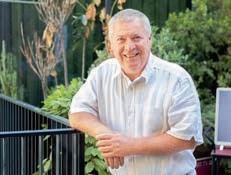


EDITOR IN CHIEF: Neda Lukić n.lukic@aim.rs
DESIGN: Slađan Radosavljević Zoran Perović design@aim.rs
COPY EDITOR: Mark Pullen
TRANSLATION & EDITING: Pullen Editorial, Halifax
“CorD - 20 Years of Independent Thought and Inspiration”
CONTRIBUTORS:
Ljubica Gojgić
Zoran Panović
Radmila Stanković
Maja Vukadinović
Mirjana Jovanović
Miša Brkić, Rob Dugdale
Steve MacKenzie
Zorica Todorović Mirković Sonja Ćirić, Miloš Belčević
PHOTOS: Zoran Petrović
SALES MANAGERS: Biljana Dević b.devic@aim.rs Mihailo Čučković m.cuckovic@aim.rs Jelena Petrović j.petrovic@aim.rs
OFFICE MANAGER: Svetlana Petrović s.petrovic@aim.rs
FINANCE: Dragana Skrobonja finance@aim.rs
CEO: Ana Novčić a.novcic@cordmagazine.com
PUBLISHER: Ivan Novčić i.novcic@aim.rs
PRINTING: Rotografika d.o.o. Segedinski put 72, Subotica
CorD is published by: alliance international media d.o.o.
Resavska 1/III, 11111 Belgrade 17, PAK 125806, Serbia Phone: +(381 11) 2450 508
E-mail: office@aim.rs office@cordmagazine.com www.cordmagazine.com www.aim.rs
ISSN no: 1451-7833
All rights reserved alliance international media 2024


By Dr Slobodan Zečević Ph.D., Director of the Institute of European Studies
The most recent official visit of Emmanuel Macron to Serbia took place in late August. This successful visit built on Serbia’s already vibrant diplomatic activity during this year, which previously saw Belgrade welcome Chinese President Xi Jinping in May and German Chancellor Olaf Scholz in July

rance is committed to supporting Serbia’s EU future –a future that is now being written, said President Macron during his 9 th April 2020 meeting with Serbian President Aleksandar Vučić at Paris’s Élysée Palace. That was one of a series of meetings between the two presidents that outlined the growth of bilateral economic and political relations. The July 2019 visit of the French president to Belgrade, marking the 180th anniversary of the establishing of diplomatic relations, proved to be a memorable one. Speaking in Serbian at Kalemegdan Fortress, the French president addressed those in attendance, saying “France loves you as you
Floved her”. Macron’s most recent official visit to Serbia took place in late August and built on Serbia’s already vibrant diplomatic activity during this year, which previously saw Belgrade welcome Chinese President Xi Jinping in May and German Chancellor Olaf Scholz in July.
How would it be possible to realise Serbia’s European future in practice? On the military side, Serbia is obliged to ensure the safety of its airspace, which it has done to date using Russian-made combat aircraft that are becoming obsolete. Serbia should procure a squadron of the new generation of France’s modern Rafale fighter jets in the near future, with the deal valued at a total of approximately three billion euros.
Serbia’s citizens are increasingly vocal in expressing their demand for a clean environment and adequate quantities of clean drinking water, particularly during the sweltering summer months. Cooperation with France in the fields of ecology and water management would be invaluable, considering the country’s technological knowhow. Serbia will also have to
Serbia’s EU accession journey has been at a standstill for the past two and a half years, given that Cluster 3 hasn’t even been opened despite Belgrade having long been ready for that. French political support would be important in this sense
consider its next steps in the energy sector, given the increasing amounts of electricity being consumed. Once it has utilised all its hydro resources, it should be ready to introduce modern nuclear technology. France’s new generation of small modular reactors represents a possible solution for the decades ahead. Serbia’s EU accession journey has been at a standstill for the past two and a half years, given that Cluster 3 hasn’t even been opened despite Belgrade having long been ready for that. French political support would be important in this sense.
France and Italy also halted the accession of the so-called Republic of Kosovo to the Council of Europe, but the regime of Albin Kurti is now preparing to apply new pressure to the Serb population with the opening of a bridge in Kosovka Mitrovica. The French president holds the firm stance that Pristina must establish the Community of Serb Municipalities, as the ultimate precondition for the survival of the Serbian people in Kosovo.
Serbia is also increasingly investing in healthcare equipment, but that’s not enough. A higher level of training for doctors and the improved organisation of work is required, and French knowhow should be utilised to this end.
We can see from all of the aforementioned that the field for French-Serbian cooperation is wide, but also that Serbia’s route to the European Union could lead us via Paris.

In my father’s village, only the teachers were called “sir”. We today pay them poorly, underappreciate them, and sometimes even beat them – they are beaten by us or our poorly raised children if they don’t go out of their way to satisfy our parental nonsense. Are we approaching the point at which only masochists will be interested in teaching our children and youth? ~ Vladimir Kostić
Dr Vladimir Kostić Ph.D. neurologist, university professor and academic
By Ljubica Gojgić
The educational system requires radical transformation, says neurologist, university professor, former member of the National Council for Higher Education and former president of the Serbian Academy of Sciences and Arts Vladimir Kostić, speaking in this interview for CorD Magazine. According to our interlocutor, any debate on this important topic should start by answering the question “are we even interested in the future?”, and what kind of role education is intended to play at this time “when knowledge and intellectual work are disappearing like other “quasi-values”, consigned to the margins of the sentimental enlightenment epoch and towards which even the “market” is becoming disinterested. Addressing the lack of discussion of important social issues in Serbia – not only education, professor Kostić notes that “the government, which perceives any disagreement
and difference of opinion as interference in its own prohibition, is highly unlikely to agree to a debate.”
In Serbia, which is considered a very divided society, there has been an announcement of a dialogue on the vital issue of mining, given Serbia’s new reserves of so-called critical materials, including lithium. Do you believe it’s possible to have a real debate and to reach a decision that’s in the interest of citizens? — Unfortunately not. Although I was taught that two parallel lines will nonetheless come together in infinity, a radical divergence and mistrust has emerged between those two lines (if there are only two?), many dreadful and unforgivable condemnations and lies, finally arresting and detaining those from “broken gangs”. If we also initiate mutual conversations, they shouldn’t be limited to discussing “lithium mining”, as a relevant quo-
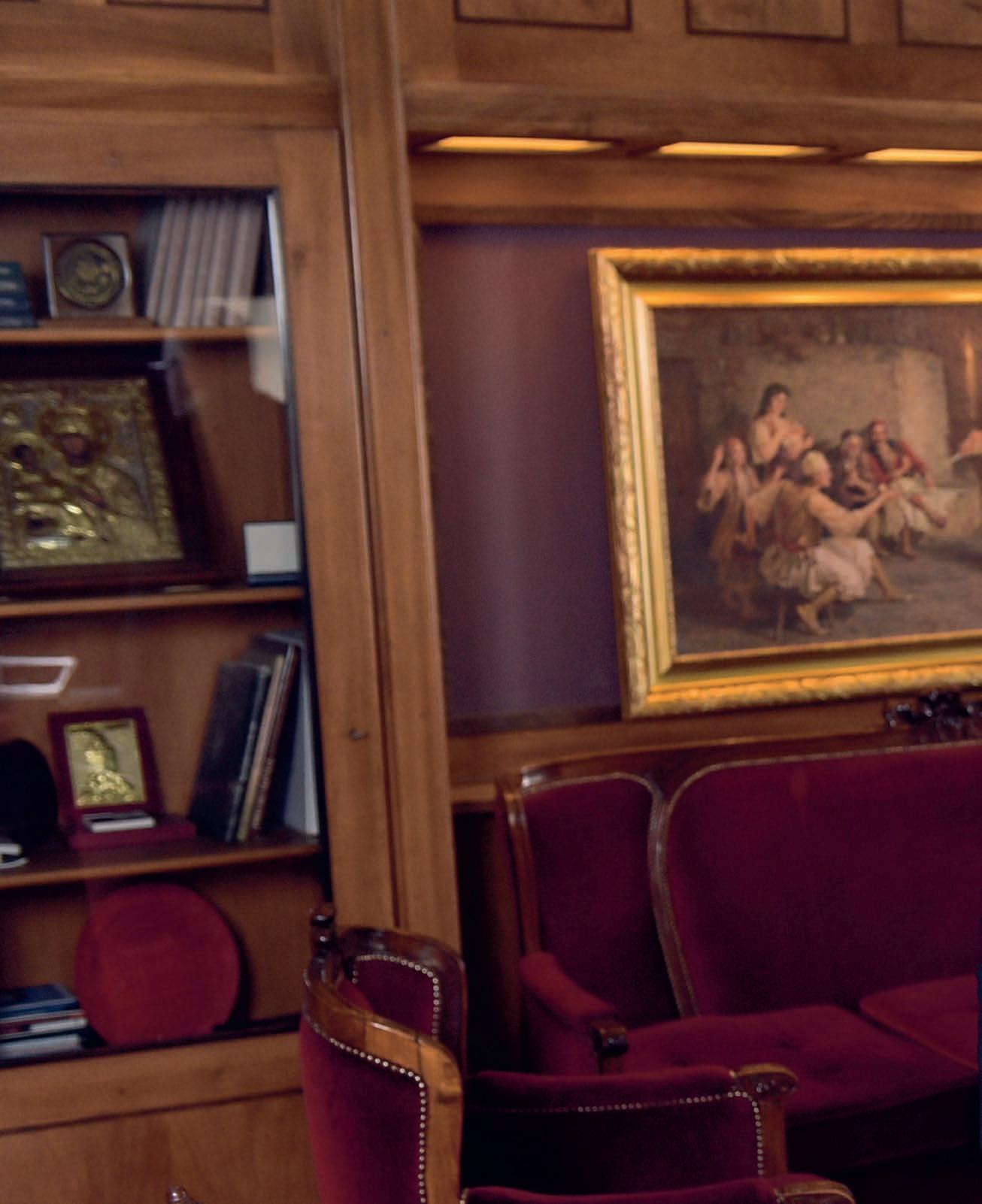
rum can’t be achieved through detainment – the dialogue only makes sense if entered into voluntarily. And that’s why I’m sceptical.
One of the ruling party’s well-known figures (frankly, well-known for having switched parties), appeals to citizens from the “small screen” to also trust their leader unconditionally on this issue. That is interesting, because, at the end of the first quarter of the 21st century, unquestionable faith is being offered (the inquisition comes later, when cracks appear) in a place where it is necessary to critically assess everyone’s opinion, including one’s own. Along these lines, one ministry instructs indubitable acting and artistic greats not to meddle in their own fears and dilemmas, not to advertise themselves (which we have the right to do even when wrong). It is its choice to recite other people’s songs in performances, and they will take care of us and everything else.

To be honest, similar advice was given during the period of some other governments and is a certain recipe for immobilising society or, for me not to be a doctor in this interview, for putting a plaster cast on society, with the advice to rest up.
On the other side, the opposition or potential opposition side, I unfortunately see a grotesque blossoming of an imposed and lengthy anti-political campaign with the simple mantra “all parties are the same, and therefore the worst”. With the possibility of being sorely mistaken, I see this as a self-harming boomerang shot, as I’m sceptical that such political and ideological heterogeneity of dissatisfied social groups could find a solution at some “Cossack Assembly”. Finally, if I were in power and wanted to hold on to it at all costs, this “anti-partisanship” philosophy would suit me perfectly. Thankfully, I’m not!
During the most comprehensive discussion on mining to date, organised by SANU while you were its president, we heard warnings that decisions on new undertakings in this area must also consider health ramifications, apart from economic calculations, by gauging the consequences of this kind of economic growth on the health of people in Serbia, who are threatened by numerous factors. Is the issue of the nation’s health understated or overexaggerated?
— As you’ve mentioned that meeting, I must emphasise that we tried to invite all relevant parties to attend, with the idea of firstly posing the right questions and possibly receiving, among other things, the right answers from the interested company. We didn’t receive a series of answers, so the questions logically multiplied.
When discussing resources, with a demographic situation that’s critical at both the regional level and across the majority of Europe, during years when ever fewer pupils are being enrolled in year one of primary school, departures from the country mean that people are

also becoming an increasingly limited resource in our country. In this case, the health of the nation, to use that jolting term, should be placed on the pedestal of general interests, and healthcare and medical protection should be treated as a highly cumulative branch of production. Because that’s what it is, in its own indirect way.
You’ve stated that we live is a hectic time in which the priority is to “get the job done”; a time characterised by the hyperproduction of information, on the one hand, with a lack of critical thinking and introspection on the other. One could say that we are successfully “climbing the slopes of artificial intelligence”, as you once noted. Do you fear that kind of future?
— I’m personally only able to fear the near future.
We were fascinated when we received weekly reports on our phones about our own movements or the places where we’d spent an hour or two –and then we came to the slow realisation that this wasn’t so innocent; that our privacy was being seriously limited and that we were ultimately being monitored (feel free to dub that paranoia). They recognise our faces even when we wear masks. Recently, at the airport in Frankfurt, where my wife and I were trying to find an alternative for a lost flight, we were only able to communicate with an intelligent machine.
In response to us noting that the proposed new flight was logically nonsensical given the explanations we’d provided, we received a fantastic response: “Please, if you could address us using shorter sentences!” I instantly realised that we’d found a weapon: against the machine, use loquaciousness and long, flattering sentences, and not rage (at least for a while). Perhaps even poetry.
A sentence remained imprinted in my memory from the conversation between Umberto Eco and Carrière: “Is the abundance of information showered on us by the internet every day not just a cover for a loss of meaning?” Unchecked data, half-truths and lies stand side by side with reliable facts. There is no established hierarchy among them… Apart from this, we are also coming to the slow realisation of the planetary ruse that information (whether accurate or not) isn’t the same as knowledge. That’s why these authors believe that proper culture represents a long process of selection and triage. But the genie has been let out of the bottle. We realise slowly and with terror that social media platforms, naively perceived as electronic marketplaces, are commonly used as instruments to recruit like-minded people and some unclear and insufficiently understood evil. Is that evil inherent in man, in the same way that we’ve long believed that he is inherently good? I don’t know! But I have a feeling that he won’t surrender.
You stated something in one interview that could resemble a diagnosis of society: “Deep into middle-age on average, we embrace opportunism and life passes us by like on some tedious carousel – we spin round in a circle to exhaustion. We’ve convinced ourselves that we deserve for the future to be delivered to our address by someone else... some delivery service”. Does a cure for such a condition exist?
— As I answer this question, I just happen to be turning in my hand my “lifetime public transport pass” - I suppose the City Public Transport company has also determined that, considering my
If we also initiate mutual conversations, they shouldn’t be limited to discussing “lithium mining”, as a relevant quorum can’t be achieved through detainment
On the opposition side, I unfortunately see a grotesque blossoming of an imposed and lengthy anti-political campaign with the simple mantra “all parties are the same, and therefore the worst”
We aren’t a rowing boat that accidentally ended up in a preposterous harbour, then – feeling dissatisfied with the time spent in the harbour – sits in the boat again and rows towards more promising meridians
survival prospects, that won’t be an excessive expense. And with this question you, as an outstanding journalist, are actually indirectly interested in whether a 70-year-old has a “lifetime public opinion pass”. I don’t and shouldn’t have one, because like all dinosaurs (perhaps it would be more apt to identify me with some smaller and less significant reptile) I am ever less able to handle the environment and time in which I live. Presumably with age, most people accept the motto “just for it not to get worse” (and it will!). I get particularly annoyed by my peers who have a keen desire to teach younger people how to position themselves regarding the emerging future, using antiquated and shabby associations and comparisons, as if they’ve already lived in that future. I don’t have anything to say to those younger than me, except maybe: “Be braver and more decisive”, though even in that case I’m not sure that suggestion doesn’t hide a more sincere message: “However you’re able, avoid being like us, your passionate advisors!”. That is one possible cure.
Every summer for many years, following university entrance exams, we hear the same statement: that there’s ever less interest among young people in studying their native language, mathematics, biology, chemistry... In one public appeal proposing the Platform for preserving the education system, University of Belgrade professors state that the system is “seriously violated and shaken to its core”. Do you see a way to make education an actual state priority, and not merely a declarative one? — Aristotle allegedly said “if there are no shoemakers, Athenians will go barefoot; and if there are no teachers, there will be no Athenians”. But it’s as
though we missed that point. At the last SANU symposium on all levels of education in Serbia, there was a presenting of numerical data that would lead a decent person to at least serious concern, if not despair. And let’s not fool ourselves: this isn’t about us preserving the system, but about us reforming it radically. The government, which perceives any disagreement and difference of opinion as interference in its own prohibition, is highly unlikely to agree to a debate. I’m afraid that there are also many who have reached their positions without previously exerting educational efforts – why would such people be inter -
We realise slowly and with terror that social media platforms, naively perceived as electronic marketplaces, are commonly used as instruments to recruit likeminded people and some unclear and insufficiently understood evil
ested in something that proved neither essential nor necessary in their own sharp trajectories of advancement? And, just so it doesn’t turn out that I’m only blaming the government, when several colleagues, including me, resigned as members of the National Council for Higher Education in disagreement over the new Law on Higher Education, no one asked why we did so, believe it or not. In my father’s village, only the teachers were called “sir” (one of them deserves the most credit for my family’s educational emancipation). We today pay teachers poorly, underappreciate them, and sometimes even beat them – they are beaten by us or our poorly raised chil-
dren if they don’t go out of their way to satisfy our parental nonsense. Are we approaching the point at which only masochists will be interested in teaching our children and youth?
I would reiterate that a debate on reform is essential, but at this time when knowledge and intellectual work are disappearing like other “quasi-values”, consigned to the margins of the sentimental enlightenment epoch and towards which even the “market” is becoming disinterested, is it even clear to ourselves what role is intended for us? And are we even interested in the future?
ProGlas, which you co-initiated, was presented as a call for society to become more actively engaged in discussing important issues. It nevertheless seems as though the public expects an answer to the question of whether ProGlas is a new political option or part of an existing one. What do you think the future of ProGlas should be?
— Firstly, politics is a job that’s too important to be left to politicians alone, and that would be one of the key axioms from which we generally launched the story of ProGlas. No, ProGlas isn’t a new political option in the narrow sense of the word – in the end, we don’t have identical stances on all issues (that was finally seen recently). On the contrary! We aren’t even hierarchically structured – ProGlas has no “boss”. To the question of whether we’re part of an existing political option, the answer is again “no”, though there have been matchmakers and even those who claimed to know what stood behind our “alleged” independence. I don’t know if anyone from the ranks of ProGlas has even shown indirect interest in any functions or gains. If, hypothetically,
some of us “succumbed” to such temptations, I’m afraid that would spell the end of ProGlas.
I see the future as a tenacious effort to encourage civic participation, to explain to our fellow citizens that they are obliged (and don’t only have the right) to consider their own lives and future, and to fight for them. Communication with a wider network of civil movements and initiatives will be a particularly delicate challenge, but I’m of the personal opinion that there’s no substitute for this type of undoubtedly important engagement and organisation, nor some kind of imposed simulacrum of political life, in which parties undoubtedly play the most important, key role. Finally, it will be a challenge to overcome the duality between what I would call an enlightening mission, with an awareness of the pretentiousness of such a self-proclaimed role, and the unwanted tribune role, which we are often cunningly directed towards, or which is naively demanded of us.
EU relations are among the issues proving the division of our society, and conversations on this topic most often shift between apologetics and complete denial. How do you think the EU and the European integration process should be viewed from Serbia’s perspective at this juncture? — It should be viewed in large part as an issue of testing reality. Our relationship with Europe (and we are part of it whether we, or they, want that or not) is an issue of geography, and geography is our destiny. We aren’t a rowing boat that accidentally ended up in a preposterous harbour, then – feeling dissatisfied with the time spent in the harbour – sits in the boat again and rows towards more promising meridians. This persistent and often irrational denigration of Europe has lasted for a long time (because, as we know, they’re “all against us”) and then I recall Zmaj’s verses “Europe, harlots”. We present Europe as some kind of compact, homogeneous threat, and that’s somethings it’s never been (homogeneous). We have to find our own
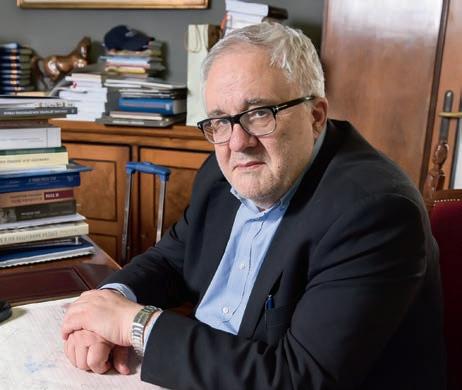
We don’t see that Europe also suffers (and doesn’t know how to handle those migraines) from the same plagues that torment us: hypocrisy, democratic deficit, countless differences (which are called advantages in celebratory speeches), the lack of a common identity, old political resentments, migrations etc.
place on our own continent – instead of that our mouths are full of things in which we’re the only ones, the last ones etc. etc., naturally in the shadow of unquestionable moral correctness, among stumbling neighbours.
We don’t see that Europe also suffers (and doesn’t know how to handle those migraines) from the same plagues that torment us: hypocrisy, democratic deficit, countless differences (which are called advantages in celebratory speeches), the lack of a common identity, old political resentments, migrations etc, etc. With such an absence of a shared identity, one sinks into artificial self-determination by excluding others who “aren’t like us” (and what kind is that?). In this unfortunate juncture of global confusion, on both sides, we all seem to be opting for “xenophobic distinction”, which could prove fatal for us, given how few of us there
are. I also saw as ominous the most recent visit of European powerbrokers and bureaucrats, who were joined - in truth only through an announcement – by an official from across the Atlantic, who in all of Serbia see only lithium. I wondered whether it’s possible that they are also so arrogant. I can’t remember the name of whoever referred to such “intense diplomatic efforts” as the “skilful and nasty smoking out of bees”. Finally, stupidity – that invincible constant of human civilisation – is today exclusively a privilege of the powerful, while we need wisdom like never before.
An impression has been created among part of the public whereby “European” and “national” are seen as being mutually exclusive. Do you think resolving to have a future in the EU must go “hand in hand” with the acceptance of Kosovo’s independence, under the conditions dictated by the ongoing dialogue and agreements reached under the scope of that dialogue?
— The first dilemma was over whether “national” and “democratic” are mutually exclusive, while now that’s applied to “national” and “European”. In both of these dichotomies, exclusivity occurs when either endpoint malignantly hypertrophies to the extent at which there’s no room for anything else. It doesn’t matter whether that’s our ritual nationalism or the sleepwalking of those who only see Europe through the imaginary contours of a non-existent Camelot. Nothing has to go handin-hand, if we reach agreement. But when it comes to the dialogue that you mention, and the agreements that may or may not have been reached, I know nothing or, more precisely, almost nothing. Like most citizens of this country! Finally, and feel free to call it demagoguery, instead of “recognising” or “granting” independence, we should today prioritise the public formulating of a way to protect our fellow citizens in Kosovo. They have been held hostage by general hypocrisy for far too long.


In celebrating the 50th anniversary of democracy, following the Carnation Revolution of 1974, Portugal wants to foster this good relationship, considering Serbia’s EU accession perspective, which we very much favour, sooner rather than later, while also taking into consideration our own experience of almost 40 years committed to European integration, while not jeopardising, but on the contrary taking a more universal approach to international relations globally, which has always been a Portuguese fundamental characteristic that, curiously, I also find a certain resemblance to in Serbia - José Rui Velez Caroço
H.E.
José Rui Velez Caroço Ambassador of Portugal to Serbia
By Ljubica Gojgić
The strengthening of bilateral cooperation that has been continuing for almost an entire century, with an emphasis on expanding economic cooperation towards the digital economy, renewable energy and water management, is a task that Portugal’s new ambassador to Serbia has set for himself. Ambassador José Rui Velez Caroço says that Serbia can rely on the support of Portugal in its European integration process, with a former Portuguese prime minister having recently taken on the role of president of the European Council.
Your Excellency, you took on your new role as ambassador to Serbia at the beginning of the year. What are your impressions so far?
— I proudly presented my credentials to President Aleksandar Vučić on 2 nd Feb-

ruary and have been really enjoying Serbia very much since then. In addition to the country’s beautiful landscape, remarkable historical heritage and rich culture, I am truly impressed by the friendly, heartwarming hospitality and kind spirit of the Serbian People, which I gladly find in small yet significant gestures every day in normal life. I think that a foreigner never feels truly foreign in Serbia, but rather like a guest and a special one at that, with all the pleasant sympathy we encounter everywhere. There are many things in the Serbian way of live, such as enjoying being among family and friends outside, open air activities, sport and leisure, a certain love for food, gastronomy and café culture, that I find quite similar to Portugal. Having spent many years working in different places, in Europe, Southern and Western Africa, South and North America, I feel really comfortable and happy to now be
in Belgrade, a magnificent, vibrant and cosmopolitan capital that I recommend everyone visit and appreciate, intending also to visit other cities and parts of Serbia.
Diplomatic relations between Portugal and the former Yugoslavia were established 50 years ago, while bilateral relations with the Kingdom of Serbia date back almost 100 years. How do you view these bilateral relations today?
— It’s true that Portugal and Serbia have benefited from friendly cooperation that has lasted for decades, despite the relative geographic distance between the two countries, with Portugal somewhat distant on Europe’s southern coast of the western Atlantic. In celebrating the 50th anniversary of democracy, following the Carnation Revolution of 1974, Portugal wants to foster that good relationship, bearing in mind the perspec -
tive of Serbian accession to the EU, which we very much favour, sooner rather than later, while also taking into consideration our own experience of almost 40 years committed to European integration, while not jeopardising, but on the contrary taking a more universal approach to international relations globally, which has always been a Portuguese fundamental characteristic that, curiously, I also find a certain resemblance to in Serbia.
Speaking in your public address in Serbia, you mentioned that you intend to contribute to the further growth of cooperation in all areas – from politics and economics, to arts and sports. What will your priorities be in this regard?
— Our relations are indeed very good from a political point of view, while we would like to increase the economic dimension, which still has a lot of room for improvement. Tourism is a domain that we want to develop further. With regular direct flights now operating from Belgrade to Lisbon and Porto, operated by Air Serbia and WizzAir, we are already seeing an increase in travellers both ways. We are also prioritising higher education, with Portuguese – as a universal language spoken by hundreds of millions and growing – taught at Universities in Belgrade and Novi Sad, in fruitful partnerships with the Portuguese ”Camões” Institute. Culture and Arts activities, like music, attract numerous members of the public and I have already witnessed the fantastic reception of Serbian fans of certain famous contemporary Portuguese singers.
Do you see any tangible ways to improve economic cooperation between Portugal and Serbia?
— The renewable energy sector, where we have quite significant knowhow, could be of interest, as well as the field of urban and rural environmental water management and treatment, where Portugal has achieved incredible progress in recent years. You can

today see dolphins in the Tagus estuary of Lisbon’s industrial port, while all the beaches, the coastline and rivers in the interior for swimming and diving activities are pollution free. Cooperation in the digital economy and online services, considering what has been done in the Portuguese Public Administration and the significant increase of Digital Nomads that choose to live and work in Portugal, including from Serbia, could also be better exploited. The necessary adjustments for Serbia’s desired full EU membership and the Belgrade 2027 Expo are certainly encouraging factors in fostering this type of mutually beneficial cooperation.
Your interlocutors in Belgrade are counting on Portugal’s support of Serbia’s European integration. What
Tourism is a domain that we want to develop further. With regular direct flights now operating from Belgrade to Lisbon and Porto, operated by Air Serbia and WizzAir, we are already seeing an increase in travellers both ways
do you see as the biggest challenges on this path?
— And they are right, as Portugal fully supports Serbia’s European integration. Serbia should join the EU. That is good for Serbia and for the EU, as well as for the Balkans. Portugal has always advocated EU enlargement, for a stronger and better Union. We value the EU and its principle of unity in diversity, ensuring the specificities of each member state, their cultures, traditions and languages, alongside the undeniable economic advantages, adding more possibilities and opportunities for everyone, with no internal borders and broader horizons. That’s something the youth should be reminded about. That, of course, doesn’t come without challenges, some necessary sacrifices and even a certain price – namely in terms of adjustments and full compliance with EU rules, which we consider well worth paying, clearly beneficial to the population’s overall wellbeing in the longer run and for good.
How important is it for your country that former Portuguese Prime Minister António Costa will take on the Presidency of the European Council as of December?
The renewable energy sector, where we have quite significant knowhow, could be of interest, as well as the field of urban and rural environmental water management and treatment
— We are very proud and honoured that Mr António Costa will bring his vast experience and vision to the Presidency of the European Council, having served eight years as prime minister and as a government minister several times, a former Mayor of Lisbon, Member of the European Parliament and the European Committee of the Regions, always advocating EU ideals, principles and values, and enjoying the full support of the current Portuguese Government. He will certainly do a great job, without undermining the extremely demanding challenges that the EU is facing. We are confident that the right person was selected, working with all member states for a better EU on the world stage in the coming years. This is not the first time that a Portuguese figure has held a leading position in the EU, as well as in other relevant international organisations, like the UN, which I would also like to consider. And forgive me for perhaps being a little overly patriotic in saying that this may also express some recognition of the role and positions of my country at the EU level and internationally, by constantly defending freedom, democracy, the Rule of Law and Human Rights, favouring multilateralism, an openness to listening impartially and trying to take into consideration different opinions and perspectives, in order to achieve a possible consensus and build bridges across nations on all continents.
Serbia’s media provided coverage of the resignation of Mr Costa’s government at the end of last year over allegations of corruption related to lithium mining. Since you come from one of the few European countries that is already
If lithium reserves are valuable, it could be expected that interest in these projects in Portugal should continue normally and progress further
We are very proud and honoured that Mr António Costa will bring his vast experience and vision to the Presidency of the European Council
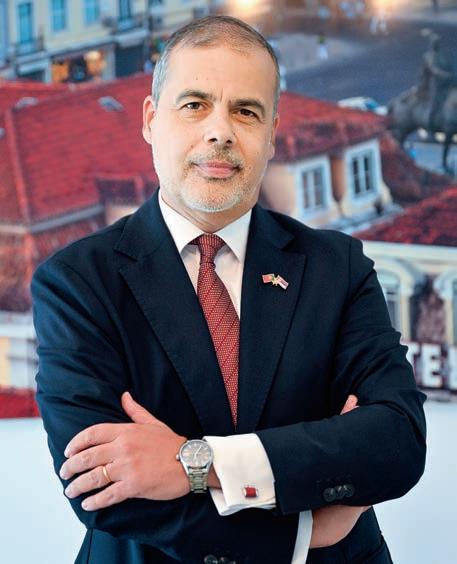
engaged in lithium mining, what would you say about the challenges this work entails?
— Portugal has a long tradition – dating back to the Roman Empire and over the course of its 900 years of independence – of mining different minerals on its territory, with varying importance in certain historical periods. Having lithium reserves allows their exploitation particularly in the broader context of the Green Energy Transition that we are facing in Europe and worldwide. That should, of course, be carried out properly, in compliance with the highest safety standards and the best scientific techniques currently available, in order to preserve nature and respect the environment that’s essential for our lives, for present and future generations, while taking into consideration the genuine and reasonable concerns
of everyone involved, especially local populations.
According to media reports from 2021, the Portuguese government was then considering withdrawing from one of its two lithium projects and ending its cooperation with a company involved in mining in Serbia. Brussels-based portal Politico reported that the “Montalegre” project had been suspended due to “a lack of professionalism” and concerns among citizens and local authorities that this mining would destroy nature and prevent people from farming. What is the current status of that project? — That’s not accurate and doesn’t reflect the current reality. Raw materials are a priority for the Portuguese Government, in line with the European Critical Raw Materials Act. Lithium is one of the critical and strategic raw materials listed in this European Regulation on Critical Raw Materials, so, if lithium reserves are valuable, it could be expected that interest in these projects in Portugal should continue normally and progress further, in accordance with Portuguese legislation. The Portuguese Government is currently monitoring the development of this project, namely through the Directorate-General for Energy and Geology, the Portuguese Environment Agency and other bodies, in order to ensure best practices, the due satisfying of economic, environmental and social responsibilities, defending public interest, the legality of the process in its different phases, and ensuring that decisions consider all relevant environmental and socioeconomic issues, involving and listening to local populations, holding those engaged in mining activity responsible and accountable.

“The freedom of the individual can never be measured by the oppression of another”
Angela Merkel
For the first time in history, a gold bar is worth a million dollars, thanks to rising precious metal prices. The price of gold reached over $2,500 per ounce, setting a record, and with the average gold bar weighing 400 ounces, its value now stands at a million dollars. Gold prices have increased by more than 20% since the beginning of the year as central banks, led by China, are buying gold to reduce their reliance on U.S. dollars. Central banks and investors view gold as a long-term, reliable store of value during economic turmoil. This is because gold prices tend to rise when interest rates fall, making bars more attractive than bonds.

Pavel Durov, the founder and CEO of Telegram, has been arrested in Paris on allegations that his platform is being used for criminal activities. The Paris prosecutor’s office revealed that Durov’s detention follows a judicial inquiry into 12 serious criminal violations, including complicity in illegal content distribution and obstruction of justice. Russian officials have condemned the arrest as politically motivated, accusing the West of double standards on freedom of speech. The case raises critical questions about the balance between privacy and law enforcement in the digital age.


The Paris 2024 Olympics boosted France’s economy by 0.5% in the third quarter, generated significant consumer spending, contributed 11.1 billion euros by 2034, and created over 180,000 jobs. The Olympic and Paralympic Games are set to significantly boost France’s economy, with the country’s central bank forecasting a 0.5% increase in national GDP during the third quarter, driven by the economic activity surrounding the events. The positive financial effects are also reflected in consumer spending, with Visa reporting a 26% increase in sales by small businesses in Paris during the first weekend of the Olympics compared to the previous year.

“Being powerful is like being a lady. If you have to tell people you are, you aren’t”
Margaret Thatcher
The upcoming presidential debate between Vice President Kamala Harris and former President Donald Trump, scheduled for 10 September, has encountered a significant hurdle in negotiations. Both campaigns are deadlocked over whether the candidates’ microphones will be muted when it is not their turn to speak. This impasse, which has sparked considerable discussion, centres around how to manage interruptions and ensure a fair exchange during the debate, according to sources familiar with the matter.


Paetongtarn Shinawatra, daughter of former Prime Minister Thaksin Shinawatra, was appointed Thailand’s new prime minister after receiving an official endorsement from King Maha Vajiralongkorn on Sunday. Her appointment follows a parliamentary vote two days after the Constitutional Court suspended former Prime Minister Srettha Thavisin. Paetongtarn is the third member of the Shinawatra family to hold the prime ministerial office, following her father, a billionaire, and her aunt, Yingluck Shinawatra. Both were ousted from power and forced into exile after military coups, although Thaksin returned to Thailand last year after the Pheu Thai party formed the government.
The European Union’s ambitious Nature Restoration Law came into force on 18 August, marking a significant step towards reversing biodiversity loss and achieving climate neutrality by 2050. The law is designed to restore ecosystems across the EU, improve food security, and help meet global biodiversity commitments under the Kunming-Montreal framework. The law mandates that EU member states introduce restoration measures on at least 20% of the EU’s land and marine areas by 2030, aiming to extend these efforts to all degraded ecosystems by 2050. Key measures include enhancing urban green spaces, restoring pollinator populations, and improving biodiversity in agricultural and forested areas.

One rule that applies to all protests, including the latest lithium mining protests, is that any mass disaffection must be grounded in a clear political strategy if it is to lead to change. Serbia’s opposition has an opportunity to articulate these protests in such a way, provided it understands that this battle is a marathon

It seems as though the issue of lithium mining, more than any other issue, prompted major disaffection among citizens, spreading to areas where there is a strong fear of expressing political views. This in and of itself, coupled with
the fact that the protests have brought together people of all political persuasions, represents an important signal for the government, though it still has many aces up its sleeve to help it avoid political crisis and the opening of the question of early elec-
tions. And yet, according to this month’s CorD Focus contributors, the discontent on the streets provides the opposition with a chance to retake the test and attempt to turn this incendiary issue into an important political debate.

Zoran Stojiljković Ph.D. Faculty of Political Science, University of Belgrade
Reactive
protests
only yield real change if they develop into a coordinated and proactive movement for change that unifies social and political demands
With regard to the potential of protests to achieve change, one of the most influential claims of the last decade is the so-called Chenoweth-Stephan hypothesis of 3.5%. Based on research covering hundreds of protests, the two authors argue that the active participation in protests of more than 3.5% of the total population leads to change in the political powerholders.
The recent anti-lithium exploitation protests that were held during the summer holiday season, and in scorching temperatures, show how the mass nature of these protests satisfies that “technical” criterion.
The key reason for this mass participation is the fact that the pro-European and national democratic oppositions have found themselves on the same anti-lithium exploitation front, or that this issue of ecological security and sovereignty prompted interest and revolt in a broad social arch ranging from rural folk to academics. Apart from apparent organisational problems, the fact that these protests are being led by environmental associations and not opposition parties has added an important “jargon of authenticity” dimension to them, as well as reducing the risk of splits and mutual rivalries among the protest organisers and participants.
This sheer amount of ire and revolt is also a result of the fact that the regime fraudulently brought lithium mining back into play - after seeming to retreat in the face of the previous wave of protests, once again through a story of huge economic benefits, and with a swift decision of the otherwise famously slow and incompetent Constitutional Court to cancel the Government’s previous unconstitutional decision. What’s new is the agreement on strategic
raw materials with Germany, which is intended to show that, apart from China and Russia, the EU will also get its share in the exploitation of strategic natural resources. This agreement was also viewed as a kind of indulgence to compensate for the sins of the East and the regime going it solo. The public was almost undivided in its negative response to the agreement, which it perceived as new evidence of the hypocrisy of the political West.
Still, even if relatively successful, reactive protests only yield real change if they develop into a coordinated and proactive movement for change that unifies social and political demands, or that harmonises persistent protests with a political strategy that can successfully rival the government’s counter-strategy.
Vučić’s spin and redirection of attention is already resulting in the raising of the issue of a referendum on public confidence in him, which – facing the prospect of losing power – should discipline many of his voters who otherwise favour a ban on lithium mining. In parallel with this, the leader is once again descending to speak to the nation, because populists don’t like mediators between themselves and their people, and expressing deep concern in promising a swift, non-institutional solution to his life problems. There is no alternative to him and his promised “quantum leap into the future” – at least while he holds all the levers of power.
Finally, if he can gain nothing else, he will at least buy time by restoring the hope of eco-realists that there will be no lithium exploitation until it is environmentally safe.
We will see in September whether the opposition has a unified and convincing response.

Dragan Popović Director of the Centre for Practical Politics
Determination regarding major social issues, regardless of how important they are to the people, doesn’t automatically lead to changes in voter preferences
The mass disaffection of Serbia’s citizens caused by the announcement of lithium mining is certainly already having an impact on the country’s political scene, including the current government’s position. This impact is demonstrated in two ways. The first is through the dissatisfaction of a section of SNS voters with government policy. This relates to an issue that can very easily reach the “hearts and souls” of voters, thanks to its populist potential that isn’t negligible. Part of the SNS voters, the part referred to in political analyses as the “soft underbelly”, is so dissatisfied with the government’s support for the Jadar project that it will turn towards other options. However, we should neither overestimate the number of those people nor the resoluteness of their decision. Most people vote for SNS because of their conviction that it is essential for the country to have a firm hand embodied in the form of a strong leader. That’s why the government responds to the protests by bringing into play its strongest trump card – President Vučić.
Determination regarding major social issues, regardless of how important they are to the people, doesn’t automatically lead to changes in voter preferences. This is also demonstrated by the issue of Kosovo, which is at least declaratively important to a large number of citizens, though at no time has that importance been reflected in election results. Neither have those who insisted on this topic achieved significant results, nor has the government that’s practically eradicated the final remnants of the Serbian state in Kosovo ever been punished by voters for doing so.
The second consequence of the battle against lithium mining could have a much greater impact. Specifically, Vučić’s authority is based on fear, like every other authoritarian
government around the world. In order to establish personal power, and particularly to maintain it, it is essential that the citizenry lives in fear, locked in some kind of permanent state of emergency that prevents them from fighting for their own interests, participating in public life and evaluating the government critically. The huge mobilisation potential of the struggle against lithium mining could result in people overcoming that fear, and consequently realising that SNS isn’t the only option and that they can try something else, without fearing the consequences for themselves and the country. Other issues, like the afore-
It is very important that people in places that have never previously experienced p olitical protests actively engaged, but a question remains when it comes to successfully articulating this discontent and providing a credible alternative
mentioned Kosovo, have almost no mobilisation potential, as has been shown throughout all these years. Even people living in places that have never previously experienced political protests headed onto the streets and squares to oppose the mining of lithium. People who aren’t afraid to express their sense of discontentment are a crucial problem for any authoritarian government, including ours. The result will, of course, depend largely on the opposition’s ability to politically articulate this discontent and offer itself up as a credible alternative.

Bojan Klačar CeSID Executive Director
Estimates that the government will fall on the issue of lithium are more the fruit of emotions than something that can be concluded rationally
As soon as the Constitutional Court cancelled the government decree halting the Jadar project on 11 th July, protests similar to those seen in 2021 erupted. The messages are the same and the scenography is the same or similar, while the organisers have changed to an extent, given that Savo Manojlović, organiser of the protests held three years ago, is no longer front and centre.
What could the political ramifications of protests against the Jadar project be? The only correct and honest answer is that it is today too soon to draw conclusions, because the issue of lithium mining is a political marathon, and not a 100-metre sprint. It seems, at this stage, that the ruling party has consciously abandoned the playing field to activists and the opposition, giving the impression that the government is in a defensive position. However, the targeted level is at least a year away, if not two. The government’s idea is for the opposition to use up its energy now, at a stage when the project is a long way from being implemented. The ruling party hasn’t taken advantage of even a fraction of the resources at its disposal, so the initial advantage gained by the opposition need not necessarily be the final outcome.
The odds that the Jadar project won’t have dramatic consequences for the ruling party increase if a rational dialogue can be established giving experts their say, and giving the government the opportunity to promote the project’s economic benefits. And vice versa, the opposition’s chances of success are greater if processes unfold more at protests, and less in institutions. The government would rather lithium was just one of several important issues, while
the opposition prefers lithium to be the only important issue. The side that proves more successful in defending its narrative can expect greater success. Estimates that the government will fall on the issue of lithium are more the fruit of emotions than something that can be concluded rationally. This is a sensitive issue for the government that isn’t easy for it to manage (and the government is itself partly to blame for that), but there is ample time to address the negative consequences.
The public’s interest is no less important. Communication regarding the Jadar project has been neglected, because no government, nor the investor itself, has dealt with com-
Communication regarding the Jadar project has been neglected, and it should now be returned to the starting point in terms of forming an informed and rational debate
municating on it transparently and carefully for 20 years. On the other hand, with the first protests we were drawn into the danger zone of decontextualised and emotionally tainted misinformation, which further fuelled the anxiety of citizens. In order to give a chance to dialogue, it is essential for all stakeholders to take a step back and offer a rational framework for the discussions. It is important for the society that any future decision be made in an informed and rational debate, as the fruit of discussion and not confrontation.


Although Europe desperately needs a new strategic outlook, it remains obsessed with a politics of consensus, and thus is stuck with a stultifying orthodoxy propagated by official circles in Berlin and Paris. That means its future may depend on Britain, Italy, and Poland creating a new political center of gravity
There is something rotten in the state of Europe. Central to French President Emmanuel Macron’s speech at the Sorbonne in April was a warning that Europe is mortal – “it can die.” Many feel an urgent need for new thinking, new leadership, and new ideas, yet it is hard to say where these might be found. Generating new ideas and forging new principles requires open debate. But Europe remains obsessed with a politics of consensus, and thus is stuck with a stultifying orthodoxy propagated by official circles and elite opinion in Berlin and Paris.
The relationship between France and Germany has been the central axis of European history for 200 years. After the caesura of World War II – which left the old elites in both countries utterly humiliated –the Franco-German twosome went on to become the foundation for the European project. But now both are paralyzed, and democracy – which
was essential to remaking postwar Europe – is floundering. French voters have just elected a hung parliament comprising the far right, the radical left, and an isolated, irrelevant center, while Germany’s unpopular coalition government remains locked in never-ending fiscal d isputes. Worse, regional elections there next month are likely to produce a French-style outcome. Europeans no longer seem to put much store in the old motors of European integration. It doesn’t help that their current leaders resemble caricatures of their respective traditions. Macron (who once likened himself to Jupiter) is Napoleonic in his love of large-scale gambles. Recall his diplomacy following Russia’s 2022 invasion of Ukraine, which soon collapsed in a futile attempt to appease Vladimir Putin. Then came his suggestion that NATO troops might need to be deployed to Ukraine, followed by his equally ill-judged decision to
call a snap parliamentary election this summer.
Meanwhile, German Chancellor Olaf Scholz has been channeling his inner Immanuel Kant, insisting on the possibility of a perpetual peace. The slogan for his misjudged European election campaign was “Securing Peace.” When he gave a speech commemorating the 300th anniversary of Kant’s birth, his audience eagerly expected him to mention the Taurus missiles that Ukraine has been pleading for. True to form, he did not.
Thus, two German obsessions –peace and balanced budgets – have produced a dangerous admixture that threatens to cut off German support for Ukraine at a critical moment, jeopardizing both peace and fiscal stability across Europe.
No wonder everyone wants a change in leadership. In the past, Europe had four pillars: France, Germany, Italy, and the United Kingdom, each of which once had similarly sized economies

doned most of its ideology. Similarly, Britain now has a sober, fiscally responsible, geopolitically savvy Labour government under Prime Minister Keir Starmer, who replaced and then cast out Jeremy Corbyn and the anti-European, anti-Semitic impulse he represents. Both countries are benefiting from the fact that previous governments made terrible mistakes.
around a new triumvirate comprising Britain, Italy, and Poland. Like France and Germany, these countries also share much history. But they also share an appreciation of current global realities, as well as a culture of debate. The Polish national anthem is the marching song of a Polish general in the Napoleonic Army. London was the seat of the Polish government in exile after 1940, and Polish airmen and soldiers played a crucial role in key WWII engagements, most spectacularly the Battles of Britain and Monte Cassino.
After the caesura of World War II – which left the old elites in both countries utterly humiliated – the Franco-German twosome went on to become the foundation for the European project. But now both are paralyzed, and democracy –which was essential to remaking postwar Europe – is floundering
and populations. However, after German unification in 1990, the proportions changed, while Italy has been discredited by perpetual political instability, and Britain by the Conservative Party civil war that led to Brexit.
Oddly, though, Britain and Italy now look better off than the old Berlin-Paris team. Italy has a sober, fiscally responsible, geopolitically savvy, pro-European government under Prime Minister Giorgia Meloni. Though she emerged from the neofascist Movimento Sociale Italiano, she has aban-
This is also a good moment for smaller countries. Denmark, Sweden, Poland, and – outside the European Union – Norway and Switzerland are showing themselves to be economically dynamic and politically and strategically innovative. Poland, the largest and fastest-growing of them, offers a unique template for a future Europe. Owing to its geographic position, it has made the greatest effort to increase defense expenditures; and unlike the larger European powers, it does not have an entrenched domestic defense industry whose lobbyists persistently block efforts to Europeanize the continent’s military capacity. Ukraine, Switzerland, and Norway all could teach their European neighbors a lot about how to adapt to today’s changing world. Macron, to his credit, has experimented with creating a wider European Political Union, and leaders from 43 countries did come together this summer for a summit at Blenheim Palace (the birthplace of Winston Churchill).
Looking ahead, one can imagine European affairs being reoriented
Britain, Italy, and Poland also live firmly in the present: they are not perpetually wrangling about the transfer of powers to European institutions or monetary integration. And they have strong traditions of debate. In nineteenth-century England, the dramatists Gilbert and Sullivan mocked the way that “Every boy and every gal/That’s born into the world alive/Is either a little Liberal/Or else a little Conservative!” Italy overcame fights between clericals and anti-clericals. And Poland survived the interwar split between two military figures with alternative visions, Marshal Józef Piłsudski and General Władysław Sikorski – a long rivalry that is echoed in the tensions nowadays between the far-right leader Jarosław Kaczyński and Prime Minister Donald Tusk.
The key attribute of a successful democracy is the old Athenian notion of parrhesia: the right, and duty, of all citizens to express themselves freely in public assemblies. The same concept is also sometimes rendered as the responsibility to speak truth to power. Hundreds of years later, it produced the flourishing of the Renaissance, with its belief that ideas and arguments should be testable as well as contestable. As the one principle that autocracies absolutely must repress, parrhesia is the key to rescuing democracy – and humanity with it.
By Harold James, Professor of History and International Affairs at
Princeton University







Goran Vukobratović PRO-ING CEO
PRO-ING has existed for nearly 80 years and has been setting new market standards from the very beginning, says CEO Goran Vukobratović, as well as emphasizing the importance of a strong partnership with clients
Experience forms a valuable foundation, but modern knowledge must always be one step ahead. This principle guides us in our daily work – says Goran Vukobratović, CEO of company PRO-ING, which boasts over 3,000 successfully completed projects for 800 satisfied clients. Speaking in this interview, he explains why it’s crucial to stay up to date, how new software tools and communication platforms are accelerating work processes, and why the market doesn’t tolerate stragglers, outdated thinking or inertia. We also discussed the necessity to adapt to clients’ needs continually, as well as the importance of investing in equipment, new tools, technologies and, most importantly, people.
Apart from innovation, your company’s key strengths today are your extensive experience and satisfied clients?
— Our longstanding experience is the foundation of our business. However, it is essential to build on that experience with new knowledge in all areas. Our employees are aware of this and are encouraged to acquire new skills. The changes in technology that we monitor demand constant innovation, as our clients’ needs evolve in line with the times in which we live. Our clients recognise this, which is why we have their trust.
You believe the best results are achieved through teamwork and close collaboration with clients and partners?
— The relationship between the client and the service provider is interactive. We’ve had longstanding business relationships with clients, which is a given. When establishing a

partnership with a new client, our goal is to establish trust from the outset through quality communication, followed by the effective and timely fulfilling of contractual obligations. This approach gradually establishes a partnership based on mutual understanding and trust. And good results are inevitable in such cases.
Changes in the technologies that we monitor demand constant innovation, as our clients’ needs evolve with the times in which we live
Your portfolio boasts over 3,000 successfully completed projects across various industries and sectors. Are there any that could be considered your hallmark, those that best illustrate what PRO-ING stands for?
— This question isn’t easy to answer; there have been many very successful projects. However, what characterises our company is that we tackle complex technologies, which often presents a real challenge. Such challenges are an opportunity to showcase our knowledge and creativity. I’m pleased to say that we achieve excellent results in this way. I can say that most of our clients today are international, but also include reputable domestic investors.

Each of your projects is unique, as you strive to adapt as much as possible to the specific needs, desires and expectations of each client. Does this ensure excellent collaboration and long-term partnerships?
— Our projects are complex and authentic. When you anticipate a client’s needs, you ap-
Experience is valuable as a foundation, but modern knowledge must always be one step ahead, and this guides us in our daily work
proach the execution of the task with due diligence, step by step. Formulating the final project task is a very creative and demanding job. We strive to integrate all their requirements and succeed in doing so, and we approach this with great care. This principle applies to every field and sector in which we operate.
Your innovative design solutions surpass conventional approaches, but not at the expense of functionality. Are you capable of realising every vision of your clients?
— It sometimes isn’t easy to combine a client’s functional requirements, the technical solutions they expect and the financial resources available for a given project. Optimising these demands and criteria is never

simple, but I’m confident that we’ve made our clients happy with our solutions. This is best confirmed by the fact that we have longstanding partnerships with almost all our clients, some lasting over ten years.
Technologies, materials, tools, machinery and trends change extremely rapidly in your field, which is why it’s important to have a team of professionals who strive to keep pace with the times. Is your team ahead of the curve?
— Technologies are advancing in all areas, with no exceptions. Knowledge must not be limited by experience; quite the opposite. Experience is valuable as a foundation, but modern knowledge must always be at least one step ahead, and this guides us in our daily work. Equipment, software tools, communication platforms— all of these have accelerated the way we work greatly, and such work requires a new approach and a new way of thinking. The market quickly recognises if you’re lagging behind and penalises you. You must therefore constantly adapt and invest in equipment and new tools. However, the most important investment is in people, and we do this continuously and are persistent in our efforts. Our experts are fluent in English, and language proficiency in general is one of the basic requirements to work at our company. We believe that we are keeping pace with the times. Our results confirm this, and we are proud of them.

“GoGreen
Plus is a service solution for our customers who have ambitious sustainability targets”
Fionn Herriott Managing Director, DHL Express
The Ministry of Information and Telecommunications announced that exports of products and services in information and communication technology (ICT) increased by 18.84 per cent in the first six months of this year compared to the same period last year, which was already a record year in this regard. The export of ICT services in the first half of this year amounted to 1.943 billion euros, and revenue from exports in this sector increased tenfold from 2012 to 2023.


Nadir Kadji has been appointed the new General Manager of METRO Cash & Carry Serbia. He previously served as Director of Operations and Sales for METRO in France. Kadji began his career with METRO France in 2006, spending the next 10 years in various senior positions within the Human Resources department. In 2016, he was appointed HR Director and a board member before stepping into the Director of Operations and Sales role in January 2021. His extensive professional experience in a country where the hospitality industry is at an exceptionally high level is expected to contribute to the company’s growth in the domestic market. METRO Cash & Carry has been a reliable partner to professional customers in the hospitality and retail sectors for nearly 20 years.
Serbia’s Minister of Mining and Energy, Dubravka Đedović Handanović, and Romania’s Minister of Energy, Sebastian Burduja, have signed a memorandum of understanding for a gas interconnection project. This strategic initiative aims to connect Serbia’s Mokrin hub with the BRUA pipeline at Petrovaselo, east of Timișoara in Romania, providing Serbia with a new source of natural gas. The agreement outlines a capacity of at least 1.6 billion cubic meters per year for the two-way gas pipeline, which will span 13 kilometres in Serbia and 86 kilometres in Romania. The Serbian segment is slated for completion by 2027, with the entire project expected to be operational by 2028.


“We aim to contribute collectively to create positive changes in the healthcare environment”
Nikola Stojković President Novartis Serbia and Montenegro

Nelt Group has incorporated rail transport into its intermodal transport network through a public train service. By combining maritime, rail, and road transport, the focus is on enhancing efficiency, sustainability, and reliability in the movement of goods. Goods are transported in containers via a direct rail link between the Port of Rijeka and Nelt’s intermodal terminals in Dobanovci and Kruševac, and vice versa. Two trains operate on this line weekly.

Serbia is gearing up for the long-awaited introduction of 5G networks, with a crucial regulatory framework expected to be adopted soon, as outlined in the newly approved Strategy for the Development of the Electronic Communications System. The strategy, adopted by the Serbian government on 8 August, sets the timeline for the 5G rollout, starting with the auction for frequency allocation slated for late 2025. The deployment of the 5G network will commence in 2026, aiming to cover 10% of the country by that year. By 2027, 40% of Serbia’s territory is expected to have 5G coverage.

Unija Consulting has been providing top-quality services for 20 years, thanks to its team of professionals dedicated to achieving excellence in all aspects of business
In terms of simplicity in making additional contributions, as well as tax attractiveness, the model for financing subsidiary companies through additional payments has become one of the most common methods for financing subsidiaries in Serbia.
The Serbian Law on Companies provides the possibility for company founders and members to make additional payments without increasing the company’s share capital. The founding act or a general assembly decision may establish the obligation for members to make additional payments to a company, either proportionally or in a different ratio relative to their share in the company.
Additional payments can only be made in cash.
An assembly’s decision to establish the obligation for additional payments must be adopted unanimously, unless the founding act stipulates a different majority
Additional payments can only be returned to the members if they are not required to cover the company’s losses or satisfy the company’s creditors.
Given that additional payments do not increase the company’s share capital, such payments need not be registered with the Serbian Business Registers Agency (APR).
However, the procedure for returning additional payments is partially aligned with the procedure for reducing share capital, as it requires that the decision on the return be registered and published on the APR website. Such a decision must remain posted on the APR website for three months, though it does not result in any changes to the registered data.
As with other methods of subsidiary company financing by a parent company, the tax implications of executing these transactions need to be considered carefully. It should be noted that additional payments are not considered loans granted by the parent company and therefore are not subject to interest calculation or the associated tax rules for transactions between related parties. Moreover, given that additional payments do not incur interest, the return of funds on this basis does not lead to a withholding tax obligation on interest payments to a foreign legal entity.
Ivana Ankić
Marketing Director, Coca-Cola HBC Serbia and Montenegro
“We are among the companies that base their growth on innovation and adding extra quality to beloved brands,” says Ivana Ankić, who has built her entire career at Coca-Cola HBC Serbia and Montenegro
Coca-Cola HBC Serbia and Montenegro’s new marketing director, Ivana Ankić, has been in her position since July of this year. With a passion for innovation and dedication to brand development, here she reveals how her team overcomes challenges, builds enduring relationships with consumers, and stays ahead of the competition.
How has your professional journey and development looked so far?
— I started my career 13 years ago, right in the marketing team at Coca-Cola HBC Serbia. Over the following years, I advanced through various dynamic positions in marketing, and later in sales. With invaluable experience of direct collaboration with our customers and partners, I transitioned to a role in revenue management, focusing on the company’s strategy and commercial policy. As of this July, I have had the honour of leading the marketing team at the company.
Given the dynamic nature of the industry, innovation and swift adaptability play a significant role in marketing. How does your team respond to this?
— We are very proud to have strong brands in our portfolio that remain relevant to our consumers year after year, achieving growth while also bringing innovations that offer individuals a different choice each year. Behind all of this stands a team of exceptional and dedicated professionals, who follow market trends and often lead them with their ideas. We are ready to recognise both successes and shortcomings, always

aware that our consumer is our most important ally and critic. The formula is simple – we listen and understand our consumers, which is why I believe we remain their first choice.
It’s hard to even list all the innovations Coca-Cola has launched this year alone. — This is definitely another dynamic year of strengthening our 24/7 portfolio. I would first highlight the expansion of our range in the segment of beverages with reduced or no sugar, in line with our strategy to offer consumers choices tailored to their lifestyles. The iconic Fanta brand now comes
in a sugar-free version, Fanta Zero, as does Next Lemonade, with lemon and pineapple flavours. Lemonades are a relatively new proposition for us, which we introduced just a few years ago, and they have already grown enough to be available in HoReCa venues this year.
Our Powerade brand, a drink designed to be consumed during training or periods of intense physical activity, which we’ve seen frequently over the past weeks during the Olympic Games, continues to achieve impressive growth and is now available in a new mango flavour. For those who enjoy our products in the evening hours, we’ve introduced the long-awaited Jack & Coke, while cocktail lovers were delighted by the Three Cents premium craft mixers that are available in four flavours.
What do you think should be the main focus for brands in the coming year, and what will be most important for Coca-Cola HBC Serbia and Montenegro?
— In addition to innovation, I believe authenticity and personalisation are key. Brands need to be inspiring and close to consumers, building a presence through long-term solutions. At Coca-Cola HBC Serbia, our priority remains winning the hearts of consumers through quality, a sincere approach, and creating unique experiences.
Complete the sentence: “If I didn’t have a career in marketing, I would work in...” — Pharmacy, most likely. Chemistry was my second great love, but marketing remains number one.


For the past two and a half decades, Božidar Aleksandrović has been steadily building an authentic Šumadija wine story with his Aleksandrović Winery, step by step, transforming Serbia into a wine destination that’s recognised worldwide. In his vineyards, his “factories under the open sky”, this visionary creates the finest, most authentic wines that are served all over the world.
Aleksandrović Winery produces around 300,000 bottles of wine exclusively from its own grapes. Do you believe this is the only proper way to maintain quality?
The awards being won worldwide by Serbian wines are proof that insisting on top quality always pays off, and that this is the path to continue pursuing, says Aleksandrović Winery’s owner Božidar Aleksandrović
after year, which is difficult in viticulture and winemaking, because we produce in a “factory under the open sky”. Many factors negatively impact our quality – drought, rain, hail and other natural disasters –things we cannot control, yet we manage to persevere.
In the years when nature doesn’t allow the grapes to reach the desired quality, and quality grapes are the foundation for producing premium wines, we select only grapes from those vineyards that can deliver quality. The rest of the grapes are turned into distillate and used to produce brandy, grappa or cognac.
For us, everything starts in the vineyard and comes down to a lot of work and knowledge. There are no quality wines without our own
WE PUT IN A LOT OF EFFORT AND WORK, AND THE RESULT IS PREMIUM WINES SERVED AT THE FINEST RESTAURANTS FROM SHANGHAI AND HONG KONG, VIA WESTERN EUROPE, TO THE UNITED STATES
— Aleksandrović Winery has around 80 hectares of vineyards in production and produces about 300,000 bottles of wine annually. Our strategy and vision from the very beginning have been to produce consistent quality. In order to be successful, you must maintain and repeat that quality year
vineyards, because the interests of grape producers and premium wine producers often conflict. Grape producers aim for higher yields and lower costs, while quality wine demands higher production costs and lower grape yields per vine and per hectare. That’s why we grow grapes according to
standards that allow us to produce premium wine.
You’ve planted your vineyards accordingly, and you treat your grapes and wine production with the same philosophy... That’s why everything is done by hand at your winery?
— In winemaking, there are two paths: the path of quality and the path of quantity. We chose the more difficult path—the path of quality—which involves establishing new vineyards, creating new wines in our vineyards, and continuous improvements. Depending on the year, we spend 200 to 300 hours of manual labour per hectare in our vineyards, not counting the use of agricultural machinery.
We put in a lot of effort and work, and the result is premium wines served in the finest restaurants from Shanghai and Hong Kong, through Western Europe, to the United States—San Francisco, San Diego, Chicago...
As a result, we also receive the most prestigious awards from Europe and around the world. Recently, our “Vožd” wine won a gold medal in London at one of the most prestigious international competitions, as have many of our other wines previously.
Despite the popularity of “Harizma” and “Vizija,” and
the awards won by “Rodoslov,” “Trijumf” remains the first association with Aleksandrović Winery?
— “Trijumf” has been our guiding star from the very beginning. A wine with a story; a wine created in the royal winery at the foot of Oplenac, a wine unique in the world. “Trijumf” identified us as a top producer of white wines, brought us our first awards, and earned us the reputation we enjoy today. Later, as our vineyards with red grape varieties matured, awards for red wines and sparkling wines began to accumulate.
“Trijumf” didn’t just bring fame to your winery; it paved the way for other Serbian wineries and Serbian wines?
— Our success on the world stage has contributed significantly to the development of the Serbian wine story, because from the very beginning we’ve been paving the way for ourselves and others. As a wine destination, Serbia was entirely unknown to Europe, let alone the rest of the world, because we have so few vineyards. Our maximum of 10,000 hectares means nothing in that world, and it’s important to remember that, during 50 years of communism and industrial wine production, no one focused on quality. That’s why we started with varietal wines from our own vineyards, which began to express the specific characteristics of this region, making them increasingly interesting as a sort of exoticism. This paved the way for us and allowed us to stand out, to sell not just Sauvignon, Chardonnay, or Cabernet Sauvignon, but to offer the exotic, distinctive aromas and flavours of our region, which the market of wine lovers and connoisseurs had never previously experienced. Our wines have helped make Serbia more recognised as a wine destination, to have people talk about Serbia as a wine destination, and for our wines to gradually develop their own identity. This
is very important, because great wines don’t exist without distinctiveness, uniqueness and identity.
An increasing number of wine tourists are visiting Serbia, and it’s undeniable that wine tourism is the future of our country’s development. You were also pioneers in this field?
— When travelling through Italy, France and California, I saw that wine tourism is entirely compatible with the vineyard story and wine production. This inspired me to invest in facilities at the winery that would allow wine tourists to
sort that will include a wellness and spa centre, wine bar, restaurant, meeting room, and new accommodation facilities... We will be able to rival Tuscany, Piedmont and other regions that embarked on this path long before us.
The third Wine Vision by Open Balkan will take place in Belgrade from 21st to 24th November this year. Are you preparing to participate?
— We were present at the first two events and are also preparing for this third one. We will have a stand at which we will showcase our

taste our wines, enjoy the winery’s ambiance and sample local food, even 20 years ago. Aleksandrović Winery currently has 14 rooms, allowing wine tourists to stay with us for several days. We also have two cottages with swimming pools in our vineyards, which contribute to our image and the image of the Oplenac vineyard region.
The Oplenac vineyard region, from Topola to Aranđelovac, now has about 20 wineries, which contributes to the opening of new accommodation facilities and restaurants. This prompted us to embark on a new investment, and we are now building a boutique hotel within the winery – a wine re-
wines, our winery and our accommodation facilities. I believe that organising an event that brings together the best winemakers from the entire region, wine lovers and traders from around the world is beneficial for all of us. Many of our partners and customers from China, Japan, Western European countries and the United States will be coming. They will visit us here at the winery, as well as at the stand at the Open Balkan event, and we will welcome them at both places with our range of wines –from sparkling wines, via “Trijumf”, “Harizma”, “Trijumf Rose” and “Oplen”, to “Vizija”, “Regent”, and “Vožd”.
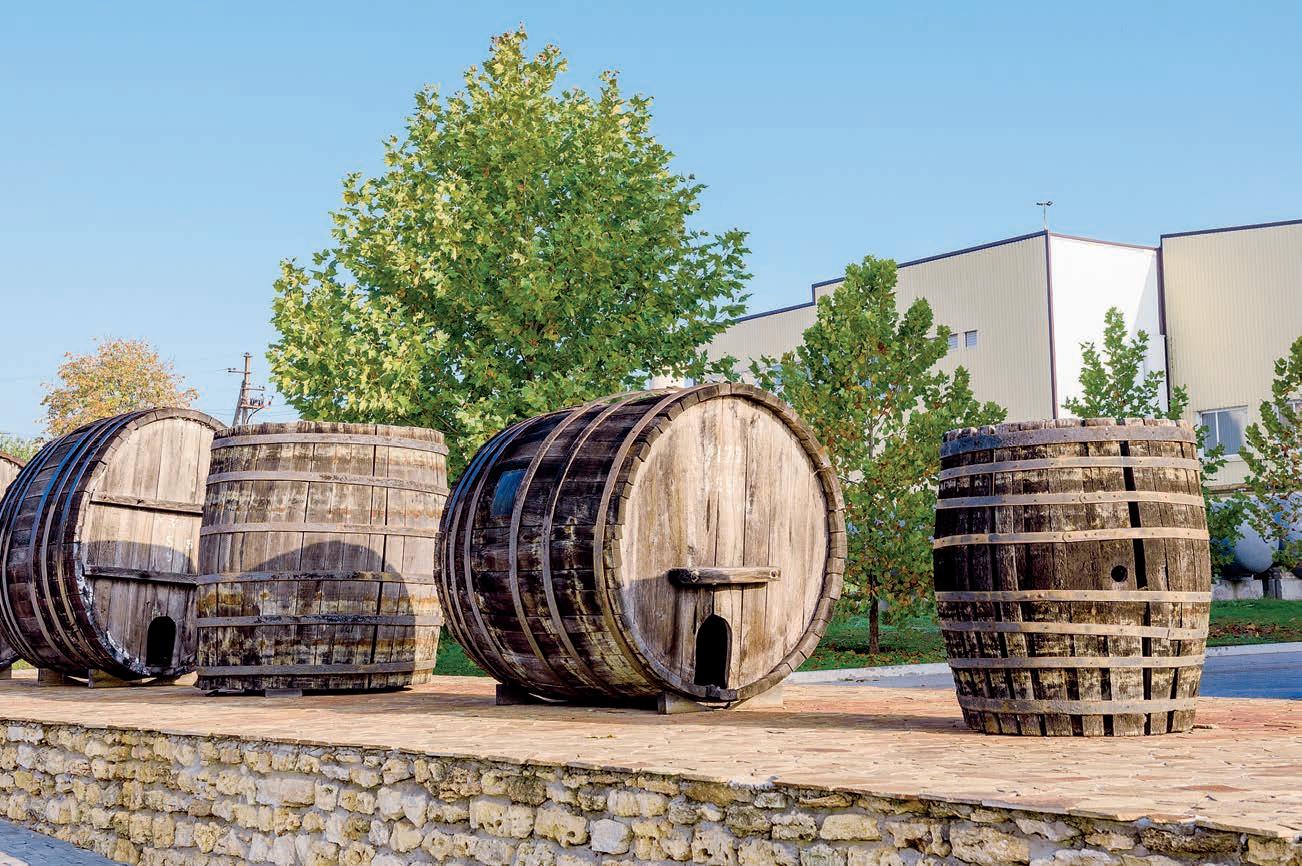
SERBIA'S WINE RENAISSANCE
Discover Serbia’s rise as a powerhouse in natural wine production and a must-visit destination for wine tourism
Serbia is making waves on the global wine scene, especially in the production of natural wines. Recently, the publication of the Michelin Guide to Natural Wines of Serbia highlighted some of the country’s top wineries, underscoring the quality of their products, which now rival the finest wines from across the globe. This newfound recognition is a testament to the dedication of Serbian winemakers who have embraced the latest technologies to craft high-quality, healthy, and natural wines.
Wine tourism in Serbia, particularly in the region of Šumadija, has experienced significant growth in recent years. More
and more locals are opening up their rural homes to visitors, offering a unique experience that includes tours of vineyards and tastings of premium red and white wines made from the finest grapes grown on the sunny slopes of Oplenac. This area, often referred to as the “Serbian Tuscany,” has a rich winemaking tradition passed down through generations, making it a prime destination for wine enthusiasts.
For centuries, grape growing and winemaking have been a way of life in this region. Autumn here is synonymous with the grape harvest and the start of the winemaking process. Much like the vineyards of France, the quality of wine in the Oplenac region depends heavily on the amount of sunshine during the growing season. The sun-drenched hillsides impart a unique flavor to the wines produced here, resulting in numerous award-winning varieties.
One grape variety, in particular, is making headlines both at home and abroad: Prokupac. Officially recognized as Serbia’s indigenous variety, Prokupac has a long history dating back to the Middle Ages. Once the most widespread grape variety in the Balkans, it is now Serbia’s best-rated wine on the international stage, captivating the attention of top oenologists worldwide.
Prokupac is considered Serbia’s most important indigenous grape variety and is a growing symbol of the country’s winemaking identity. With 400 hectares of vineyards dedicated to Prokupac, winemakers are eager to expand this to 5,000 hectares to fully capitalize on its potential. Despite its deep roots in Serbian winemaking tradition, Prokupac is gaining recognition as a unique and valuable variety, with the potential to elevate Serbia’s reputation in the global wine market.
Local governments are also recognizing the importance of wine tourism. Recently, the municipality of Topola introduced new measures to support rural tourism by offering grants of 150,000 dinars to regis-

SERBIA
A
tered rural households involved in tourism. Currently, there are 12 registered rural households in Topola, six of which have earned the prestigious four-star rating.
In an effort to further promote Serbian wines on the global stage, the Chamber of Commerce of Serbia (PKS), in cooperation with the Serbian Development Agency (RAS) and with support from the General Secretariat of the Government of Serbia, organized the first-ever appearance of Serbian winemakers at the National Stand of Serbia at the London Wine Fair 2024. This event provided a platform for Serbian wines to shine, including at the regional wine fair Wine Vision by Open Balkan.
Serbian wineries also enjoyed great success at this year’s Balkan Internation-
al Wine Competition (BIWC 2024), held in Bulgaria and Turkey, further solidifying the country’s position as a serious player in the wine industry.
Serbia’s wine tourism industry is built around 17 wine routes, each offering a glimpse into the country’s rich history and diverse winemaking traditions. Vinorodna Srbija (Wine-Producing Serbia) is divided into three main regions: Central Serbia, Vojvodina, and Kosovo and Metohija, which are home to 22 wine-growing regions and 77 vineyards. These regions host numerous wine routes, such as the famed Šumadija Wine Route, which offers visitors the chance to explore the best that Serbian winemaking has to offer.
Central Serbia, the largest region, boasts 13 wine-growing regions and 55 vineyards, with 10 wine routes to explore. Vojvodina, in the north, has seven wine-growing regions, 15 vineyards, and five wine routes, including the Srem-Fruška Gora route, known for its exceptional wines. Kosovo and Metohija, with its two wine-growing regions and seven vineyards, also offer two wine routes, showcasing the unique wines of Northern and Southern Metohija.
As more wineries continue to emerge in Šumadija and other parts of Serbia, wine tourism is becoming a vital component of the country’s economy. Winemakers are shifting their focus towards the market, moving from family-run operations to higher-end production, building tasting rooms, and expanding their capacities. This allows them to cater to a growing audience of wine lovers who are eager to experience Serbia’s wine culture.
The summer of 2024 brought extreme heatwaves to Serbia, raising concerns about the upcoming grape harvest. With ripening occurring 10 to 20 days earlier than usual, many vineyard owners are anxious about the impact of these unusual weather patterns on the quality of their wines. Excessive moisture fol-

THE VINEYARDS OF ŠUMADIJA, OFTEN CALLED THE “SERBIAN TUSCANY,” ARE ATTRACTING WINE LOVERS FROM AROUND THE WORLD, WITH THEIR SUN-SOAKED GRAPES AND CENTURIES-OLD WINEMAKING TRADITIONS
lowed by disease outbreaks in the vineyards only adds to their worries. However, regions like Šumadija and Župa seem to be faring better, with less pronounced anomalies in grape maturation.
The early harvest mirrors conditions from 2012, when a similar situation occurred. While the wines from that year were not bad, much depends on how well individual grape varieties and vineyards were managed. This year, all factors will play a crucial role in determining the quality of the wines produced.
Despite the challenges, Serbian wineries have made significant strides in obtaining organic and biodynamic certifications. After years of investment and risk-taking, several vineyards and wines have achieved certification, including the prestigious Demeter certification, which is recognized worldwide.
While the world is full of French grape varieties, Serbia’s native and localized varieties, such as Prokupac and Tamjanika, are gaining traction with both domestic and European consumers. Other local varieties, like the aromatic and fruity Bagrina from Negotin, are also beginning to make a name for themselves.
It is encouraging to see Serbia building its wine identity around indigenous grape varieties, just as other European wine-producing countries do. Serbia’s wealth of autochthonous varieties, with Prokupac leading the charge, provides a solid foundation for promoting Serbian wines both at home and abroad.
In an era dominated by Cabernet Sauvignon and Chardonnay, Serbia’s 20,000 hectares of vineyards have produced fragrant, musky black and white Tamjanika, mysterious Jagoda, Ranka, Smederevka, and the unique Prokupac. Župa, in particular, is renowned for its Prokupac, which is celebrated for its authenticity
and potential to elevate Serbian winemaking on the global stage.
In the world of winemaking, there is a growing movement to return to our roots by embracing indigenous grape varieties. Foreign wine enthusiasts are increasingly seeking out wines that are unique to specific regions, and Serbia’s autochthonous grape varieties offer precisely that. These wines provide a distinctive experience for consumers, while also offering greater opportunities for Serbian wines to succeed in the global market.
Serbia’s potential in the wine industry is further evidenced by the numerous gold medals won at prestigious international competitions, including Decanter in Italy, Bergamo, and Merano, as well as in distant China, Brussels, and Vienna. Experts agree that Serbia’s future lies in the cultivation and promotion of its native grape varieties, which have been overlooked for far too long.
As the global wine industry evolves, Serbia is poised to make a lasting impact with its authentic, unique, and long-forgotten grape varieties. The future of Serbian winemaking is bright, and the world is beginning to take notice.
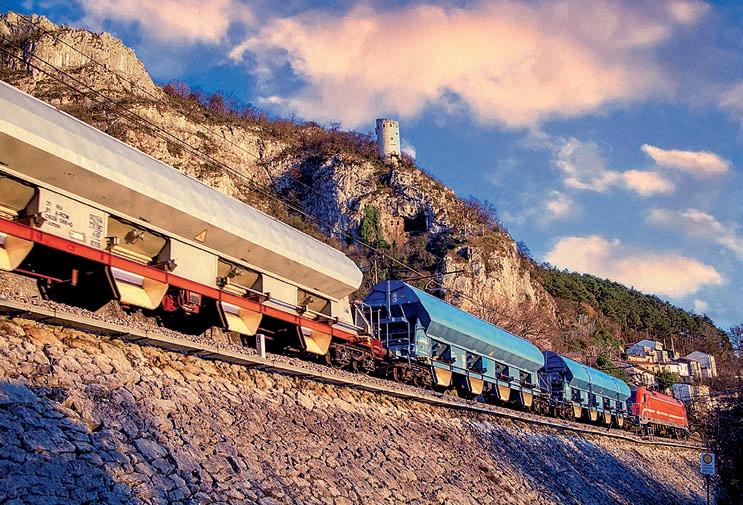
SŽ-Tovorni promet is a leading rail freight carrier in the region, offering a wide range of transport and logistics services. As a key element of Slovenian Railways [Slovenske železnice], this company delivers high-quality, competitively priced solutions to customers in Slovenia and across Europe, through an extensive network of established partners
SŽ-Tovorni promet has spent more than two decades actively engaged on the Serbian market. Initially represented by the Belgrade Office of Slovenian Railways, the company established SI-Cargo Logistics d.o.o. nine years ago. Its operations in Serbia and the wider region are closely coordinated with the Alpine-Western Balkan rail freight corridor, with Srbija Kargo being one of its key long-standing partners.
Having recognised the Serbian market’s strategic importance, SŽ-Tovorni promet
is preparing to launch a new product for Southeast Europe: a regular weekly rail service between Slovenia and Serbia, focusing on the transport of individual wagonloads. This new service will include twoway transport, with the goal of balancing goods flows while also expanding services at Serbian terminals. The company will offer additional services like storage, transshipment, customs warehousing, palletisation and containerisation, with a focus on imports and exports with Serbia. Representing a significant advantage will be the
company’s connection to the Port of Koper and German trade centres.
SŽ-Tovorni promet is committed to supporting its customers’ operations with cutting-edge IT solutions, including the E-Tovorni promet portal and e-consignment notes. The company is also undergoing a comprehensive IT modernisation process, aimed at enhancing all stages of business operations. These updates will simplify, expedite and optimise customer transactions.
Investing in modernisation is a key priority for SŽ-Tovorni promet. A tender for 30 multi-system electric locomotives has been published, while the company is also planning to comprehensively refurbish 12 of its diesel lo-
Having recognised the Serbian market’s strategic importance, SŽ-Tovorni promet is preparing to launch a new product for Southeast Europe: a regular weekly rail service between Slovenia and Serbia, focusing on the transport of individual wagonloads
comotives. The company additionally intends to purchase 750 new freight wagons. Work on the first diesel locomotive is scheduled to begin at the end of this year, with a public tender for the wagons expected next year. Over the next six years, SŽ-Tovorni promet plans to invest approximately €300 million in upgrading its wagon and locomotive fleet.
The experienced team at SŽ-Tovorni promet works tirelessly to tailor services to meet customer needs and adapt to evolving business conditions. Whether transporting full trains or individual wagons, or providing door-to-door delivery, the company consistently finds the most efficient and cost-effective way to ensure goods reach their final destination on time. As a trusted partner, SŽ-Tovorni promet remains committed to delivering high-quality and flexible services that satisfy and even exceed the expectations of customers.

“We provided the Montenegrin budget with over €43 million in excise duties on tobacco products in 2023”
Prokopije Perić CEO, Plus d.o.o. Podgorica

In a landmark move for Slovenia’s financial sector, OTP Group has completed the legal merger of its two Slovenian banking subsidiaries, Nova KBM d.d. and SKB banka d.d., creating what is now the country’s largest bank by market share in loans and deposits. The newly formed entity, OTP Banka, marks the largest banking merger in Slovenia’s history and positions itself as the second-largest non-Hungarian branch within the international OTP Group, following Bulgaria’s DSK.
In Podgorica, new-build apartments averaged €1,760 per square meter, while the coastal region commanded higher prices at €2,110 per square meter. In the central region, the average dropped to €960 per square meter. Notably, no new-build apartment sales were recorded in the northern region during this period, according to data released by Monstat, the country’s statistical office. For the business sector, the average price also stood at €1,820 per square meter in the second quarter, while there were no recorded sales in the social housing category.


Dubrovnik Rudjer Bošković Airport, the gateway to one of Croatia’s most iconic cities, is advancing negotiations to secure a second direct flight service to the United States. This strategic move follows the airport’s existing seasonal route from Newark, operated by United Airlines, and reflects Dubrovnik’s growing significance as a transatlantic hub. In recent years, the airport briefly hosted Delta’s service from New York’s JFK Airport and American Airlines’ route from Philadelphia, underscoring the region’s appeal to American travellers.

“Our ambition is to have 50 million consumers of our non-combustible products by 2030”
Jorge Araya BAT SEE Area Director

According to a recent study by Cable.co.uk, North Macedonia has emerged as the leader in internet speed across the region. With an impressive average speed of 97.9 Mbps, it outpaces its regional neighbours and ranks among the better-performing nations in Europe. The study highlights North Macedonia’s superior broadband capabilities, placing it ahead of Slovenia (97.0 Mbps), Serbia (60.5 Mbps), Kosovo (57.3 Mbps), Greece (53.9 Mbps), Montenegro (49.5 Mbps), Bosnia and Herzegovina (44.0 Mbps), and Bulgaria (40.4 Mbps), published by the statistical portal Landgeist.
SOURCE: connectingregion.com

Delta Holding owns Ananas, an online sales platform that has launched operations in Montenegro, Bosnia and Herzegovina. This expansion, announced on LinkedIn, marks a critical growth step for the company, which has a registered capital of 2,000 convertible marks in Bosnia and Herzegovina and recently established a branch in Banja Luka. Ananas had previously entered the North Macedonian market by acquiring Vebspot and its brands Grouper.mk and Paopao.mk.


Petrol, Slovenska energetska družba, d.d. Ljubljana, has announced its acquisition of complete ownership of Petrol Power d.o.o. Sarajevo. his strategic move comes after Petrol purchased the shares of seven minority shareholders, who collectively held approximately 0.25% of the company, making Petrol the 100% owner. The shareholders who sold their stakes comprised individual investors and one corporate entity, the Trading and Services Company Intra. Petrol Power Sarajevo, a subsidiary of Petrol in Bosnia and Herzegovina, specialises in electricity production.
Bojan Jevtić Founder and CEO, Avalon Real Estate
In just six months, Avalon Real Estate has become one of the leading consulting firms in the field of commercial real estate, says company founder and CEO Bojan Jevtić

his interview with Avalon Real Estate’s Bojan Jevtić reveals how the commercial real estate market has developed in our country, how this industry’s standards and quality of service are being raised, what clients expect from consultants, and where Serbia stands today in relation to the region.
TAvalon Real Estate is a specialised consulting firm that offers a personalised service to its clients. Is that what makes a difference in your business and defines your market position?
— Our company specialises in real estate brokerage. We primarily deal with commercial real estate, with a particular focus on office spaces, industrial properties, land and the capital market, without neglecting other segments of the sector, such as res -

idential and retail real estate. Avalon was fo unded on the notion of a group of real estate professionals, who’ve had an active market presence for many years, coming together to make a significant impact with their work. Our experience was more than sufficient to create a serious boutique consultancy offering a top-quality service in a different format, and enabling us to effectively cover all segments of the real estate market with a smaller team. Avalon has been around for just under six months, but the combined experience of our team of 14 exceeds 100 years. Fourteen people, a century of experience.
How important is it that standards in your industry are finally being redefined and raised?
— The real estate market in our country only started developing after the year 2000, with significant growth beginning around 2005, when foreign investors began entering the market. Thanks to new standards, coupled with the entry of foreign investors and consulting franchises, we have also been able to raise the quality of our services. For us, continuous improvement is not just a business strategy, it is part of our identity and dedication to daily growth. Our expertise is no longer
Avalon has been around for just under six months, but the combined experience of our team of 14 exceeds 100 years. Fourteen people, a century of experience
built solely on knowledge, but also on the experiences we’ve accumulated over the years we’ve spent working in this industry. Each project and every client brings new insights that shape us and ultimately make us better in future processes. Through these processes, we’ve learned that standards must constantly be raised and that, as consultants, we should redefine and surpass them each time. One of the greatest feelings of satisfaction in our business comes when clients return, and we have many of those.
As for our team, we firmly believe that success comes from constant learning and adaptation, and this experience allows us to anticipate our clients’ needs even before they define them themselves. We like to ensure that every client feels that they are in safe hands, that we have considered every detail and understood and respected their specific needs. The value of our transactions ranges from several hundred thousand euros to millions, which is why it is crucial for clients to feel that their business and money are in safe hands. Only then can we sustain our market presence.
Does Serbia have the potential to develop as a regional leader and push the boundaries of the commercial real estate market?
— The commercial real estate sector has seen remarkable growth over the past five to six years, particularly in comparison to the rest of the region. We have made significant progress compared to Zagreb, Sofia, and even Bucharest, as we had been lagging behind them for many years. We have nearly reached Sofia’s level when it comes to many key commercial parameters, such as rental prices and the number of leased square metres. One parameter that particularly pleases investors is the percentage of available space; Belgrade stands at 6%, while that percentage is closer to 15% in Sofia and Bucharest. As a result of these positive trends, we have increasing opportunities to work with clients who recognise Serbia as an attractive investment destination.
Expo 2027 is expected to be greatly significant for Serbia’s development. How will this event impact your industry?

We like every client of ours to feel that they are in safe hands; that we have considered every detail, and understood and respected their specific needs
— The EXPO will undoubtedly have a massive impact on our industry and beyond. In fact, it is already bringing us a lot. This event will provide an extraordinary opportunity for the development of all real estate sectors, as it will increase Serbia’s visibility on the global stage and attract significant investments in this segment. We are already seeing progress, with many international players interested in hotels and logistics. There has already been a significant increase in interest in real estate, particularly land, which is reflected in rising prices. In the first quarter of 2024, over 300 properties were purchased
in the Surčin municipality, where a completely new city is being built on 240 hectares for Expo 2027, which is more than 30% higher than in the same period of last year. Many investors are buying land, believing that its value will increase and that infrastructure will follow – something we have no reason to doubt, as this is a project of national importance. The plots being sold are zoned, primarily for commercial purposes, meaning that the focus will be on the construction of commercial real estate and logistics centres, while there could be greater development of residential projects later. Trends suggest that the EXPO will have a long-term positive impact on Serbia’s real estate market, and we will continue to provide strategic advice that will enable our clients to make the most of these opportunities.
Your personal experience includes leading some of the largest transactions, sales and successful realisations. Are you ready to surpass these achievements?
— I have been in this business for almost 20 years, having worked with all major companies on the market and, finally, several of us colleagues decided to launch our own consultancy. We have seen that we possess enough knowledge, experience and courage for such an undertaking. We have been helped by the fact that we’ve worked on a large number of purchase and sale transactions worth over 320 million euros and leased more than 235,000 square metres of space on a market that has approximately 1.4 million square metres in the office segment. Although these are very significant figures percentage-wise, I believe we will surpass them. Judging by the first six months of our operations, during which we leased over 27,000 square metres, and considering that we are on track to realise some very large capital investments by our standards, namely the sale of large assets, this optimism isn’t unfounded. We have a very high-quality team, first and foremost comprising good people who are full of enthusiasm; a team that understands the market and trends, is proactive, client-oriented and dedicated to every detail. Such a team is a great privilege today – a team that is ready to respond to all our clients’ needs.

IOANNA REGEN
Led by Prof. Dr Ioanna Batsialou, IOANNA REGEN Polyclinic in Belgrade offers top-notch stem cell treatments that rejuvenate the skin and organs, revitalising both body and spirit

+38111/ 455 03 00
+38163/ 80 39 369
I n the heart of Belgrade lies IOANNA REGEN Polyclinic, the leading centre for regenerative medicine in the region. Founded and directed by Prof. Dr Ioanna Batsialou, one of the world’s foremost experts in aesthetic and regenerative medicine, the clinic combines cutting-edge treatments with a profound dedication to patient care. A pioneer in mesotherapy and stem cell therapies, Prof. Batsialou has spent over 22 years refining her expertise through education, research, and participation in international congresses, all in the pursuit of preserving the health and beauty of her patients.
Throughout history, mankind has sought immortality, searching for elixirs of health and youth. Today, at IOANNA REGEN, one of the most prominent and best-equipped clinics in Europe, we have discovered that elixir through the application of regenerative stem cell therapies. Our mission is to offer treatments that not only restore the skin but also rejuvenate internal organs and the entire body, delivering lasting results and enhancing the quality of life.
Every procedure at IOANNA REGEN is meticulously designed to provide exceptional quality and long-lasting results while
preserving the body’s natural anatomy. Our regenerative stem cell therapies are specifically tailored for facial rejuvenation, skin renewal, and internal organ regeneration, using natural stimulants that encourage the birth of new, youthful cells. These treatments offer long-term regeneration while maintaining the natural beauty of our patients.
One of the latest and most effective methods we employ is exosome therapy. These microscopic vesicles, which cells use for communication, contain proteins, lipids, and genetic material that stimulate renewal and
One of the latest and most effective methods we employ is exosome therapy. These microscopic vesicles, which cells use for communication, contain proteins, lipids, and genetic material that stimulate renewal and regeneration processes
regeneration processes. Exosomes act as natural catalysts for cell regeneration, activating collagen and elastin production, reducing inflammation, and accelerating the healing process. The result is visibly rejuvenated skin with reduced wrinkles and improved tone.
At IOANNA REGEN Polyclinic, we utilise various types of stem cells to achieve optimal regenerative results. Stem cells have an extraordinary ability to differentiate into different types of tissues, allowing them to regenerate damaged areas of the body, rejuvenating the skin, muscles, tendons, and even internal organs. Combined with cutting-edge technologies and techniques, the regenerative therapies we offer represent the future of medicine, providing patients with the opportunity to restore their youthful vitality and well-being.
1. Plant-based stem cells: Plant-based stem cells, such as those derived from rose, Centella Asiatica, argan, and Swiss apple, are rich in antioxidants and bioactive substanc-
es that aid in skin renewal. These cells stim ulate collagen synthesis, improve hydration, and restore the skin’s elasticity, leaving it smooth, radiant, and visibly rejuvenated.
2. Fish-derived stem cells: Trout nucleo tides and salmon stem cells, obtained from fish sources, offer powerful regenerative ef fects on the skin. These cells accelerate the healing process, reduce inflammation, and restore cellular structure, contributing to a healthier, revitalised complexion.
3. Animal-derived stem cells: Animal-de rived stem cells, including those from pigs, cattle, and horses, possess exceptional re generative abilities, helping to restore skin structure. These cells enhance skin firmness and elasticity, reducing the appearance of wrinkles and improving overall skin tone.
4. Human-derived stem cells: Stem cells derived from human placenta provide the highest level of regeneration, of fering significant impact on the re pair of damaged tissues. These cells contribute to the regeneration of not only the skin but also internal organs, helping to restore func tionality and vitality to the body. Human-derived stem cells are par ticularly effective in treatments fo cused on long-term regeneration and anti-ageing therapies.
Our range of regenerative stem cell therapies enables a personal ised approach for each patient, of fering treatments that cater to specific needs and regeneration goals. Whether it’s rejuvenating the skin, hair, or treat ing muscles and joints, our experts utilise the latest methods to ensure the best pos sible outcomes.
Stem cell regenerative therapies can be ap plied to various parts of the body, including the face, décolleté, neck, hands, hair, mus cles, tendons, and joints. Each of these ther apies is tailored to the individual needs of the patient, offering the opportuni ty to rejuvenate both body and spirit through personalised care.
If you are looking to experience one of these top-tier therapies, the IOANNA REGEN Polyclinic, with its team of expert doctors, leaders in their field, is ready to provide you with care and at tention worthy of the gods.


”California should be leading the way in accelerating AI, not slowing things down”
Aaron Levie CEO of Box

Swiss companies and consumers can now make instant electronic payments, catching up with other European financial centres where ultra-fast transfers are becoming increasingly popular. Instant payments allow credit transfers to be completed within 10 seconds of payment instead of waiting days for the transaction to be finalised. They have been used in Europe since 2017 and in the US since last year. According to data from the European Central Bank, the use of instant payments in Europe has grown from 5.2% of all credit transfers in October 2019 to 17.8% in February.
According to a study by aviation data analysts from Cirium, the airports in Istanbul, Frankfurt, and Paris’s Charles de Gaulle have been ranked as the best in terms of connectivity and the number of destinations. The list of the 20 most connected airports during the first half of 2024 revealed that Turkey’s largest airport is connected to 309 destinations, followed by Frankfurt (296) and Paris (282). Amsterdam’s Schiphol Airport secured the fourth spot with 270 destinations, tying with Chicago’s airport, while Rome’s Fiumicino (234) was also among the top 10 from Europe


Insurance companies in the United Kingdom have reported a record-breaking £1.4 billion in payouts for damages during the second quarter of this year, driven primarily by severe weather events such as fires and floods. The Association of British Insurers revealed the staggering figures, which significantly strained the industry. The average cost of home insurance across the country rose by 6% compared to the previous quarter, reaching £396 in the three months ending in June. Meanwhile, the average premium for combined policies surged by 19% compared to the same period in 2023, reflecting the escalating risks associated with climate-related incidents.

”The AI revolution is only just beginning”
Jason Kwon OpenAI chief strategy officer

Wheat prices have plummeted to $5.20 per bushel (27.2 kg) on global markets, nearing their lowest level since September 2020. his significant drop is driven by concerns over potential transport disruptions in Canada and unexpectedly optimistic production forecasts from Ukraine. The threat of a rail strike in Canada, involving over 9,000 workers from Canadian National Railway and Canadian Pacific Kansas City Ltd, has prompted farmers to sell their grain to avoid anticipated transport bottlenecks preemptively. This is particularly critical as more than 90% of Canada’s grain is transported by rail, with the country expected to deliver around 25.3 million tonnes in the 2024-2025 marketing year.
For the third year running, the United Arab Emirates (UAE) is set to become the world’s leading magnet for millionaires, according to the Migration of Millionaires report by Henley & Partners. Globally, a record 128,000 millionaires—individuals with one million dollars or more assets—are expected to relocate in 2024. This surpasses the previous record of 120,000 set last year, marking 2024 as a pivotal year in the global migration of wealth. By the end of 2024, the UAE is expected to attract a net influx of 6,700 millionaires from across the globe, dwarfing the projected 3,800 millionaires heading to the United States, which ranks second.


China has set a new record in solar panel exports, shipping 120,427 megawatts (MW) of panels in the year’s first half. According to the Ember Institute, nearly half of this production is headed to Europe. Chinese solar panel exports to Europe accounted for 43%, or 52,158 MW, despite a 20% decrease from last year due to high interest rates, economic growth concerns, and strained relations with China. The Netherlands remained the leading market for Chinese solar panels, importing 23,421 MW in the first six months of this year. Brazil was the second-largest market, receiving 10,511 MW of panels in the first half 2024.
Konstantin Rangelov is revolutionising global logistics with innovative drone technology, aiming to transform multiple industries and improve access to essential services worldwide

Konstantin Rangelov Co-founder of Dronamics
Beyond its immediate applications in logistics, Konstantin Rangelov envisions Dronamics playing a pivotal role in a variety of sectors, each benefiting from the unique capabilities of drone technology. One such area is emergency response and disaster relief. In regions where natural disasters such as earthquakes, floods, or wildfires frequently occur, the ability to rapidly deploy drones carrying essential supplies—such as food, medicine, and communication devices— can be lifesaving. Dronamics’ Black Swan drones are particularly well-suited for these scenarios, as they can quickly access areas that are otherwise unreachable due to damaged infrastructure.
Furthermore, Rangelov is exploring the potential for drone-based medical deliveries. In remote or rural areas with limited access to healthcare facilities, drones could be used to transport critical medical supplies, such as vaccines, blood products, or organ transplants, thereby significantly improving healthcare outcomes. This initiative aligns with global efforts to en-

hance healthcare equity and ensure that even the most isolated communities have access to essential medical services.

He is at the forefront of transforming global logistics with advanced drone technology
Another frontier for Dronamics is the agriculture industry. Drones equipped with sensors and imaging technology can be used to monitor crop health, manage livestock, and even distribute fertilisers or pesticides with precision. This application of drone technology could lead to more efficient and sustainable farm-
ing practices, reducing waste and improving yields. Rangelov’s vision extends to the creation of a connected agricultural network where data from drones can be integrated with other smart farming technologies, fostering a new era of precision agriculture.
Despite the promising future, the path to widespread adoption of drone technology is not without its chal -
His vision extends beyond logistics, exploring the potential of drones in emergency response, healthcare, and precision agriculture

lenges. Regulatory hurdles remain a significant barrier, with different countries enforcing varying levels of restrictions on drone operations. Rangelov and his team at Dronamics are actively engaging with regulators to establish clear and consistent guidelines that will allow the safe and efficient use of drones in commercial applications. This involves participating in international forums and working groups where they advocate for policies that support innovation while ensuring public safety
In addition to regulatory challenges, public perception of drones is another area Rangelov is keen to address. While drones are often associated with surveillance and military use, Dronamics is working to shift this narrative by demonstrating the positive and practical applications of drones in everyday life. Through public outreach and education, Rangelov hopes to build trust and acceptance of drones as tools for good, highlighting their potential to improve lives and drive economic growth.
Looking forward, Konstantin Rangelov remains committed to pushing the boundaries of what is possible with drone technology. Dronamics is already working on next-generation models that will feature enhanced capabilities, such as increased payload capacity, longer range, and advanced autonomous navigation systems. These innovations will further solidify Dronamics’ position as a leader in the global drone market, setting new standards for what drones can achieve.
As Rangelov continues to lead Dronamics into the future, his work serves as an inspiration to entrepreneurs and innovators worldwide. His relentless pursuit of excellence and his ability to turn visionary ideas into practical solutions exemplify the power of entrepreneurship to effect meaningful change. With Dronamics, Rangelov is not just building a company; he is creating a legacy that will influence the future of logistics, technology, and beyond.

After many years and published books, I today understand writing work as a necessity of personal choice. My choice, and intention, is to take artistic action in society, while my job as a writer is to imagine and construct, dream and search, and thus create my own reality, just as God created the world
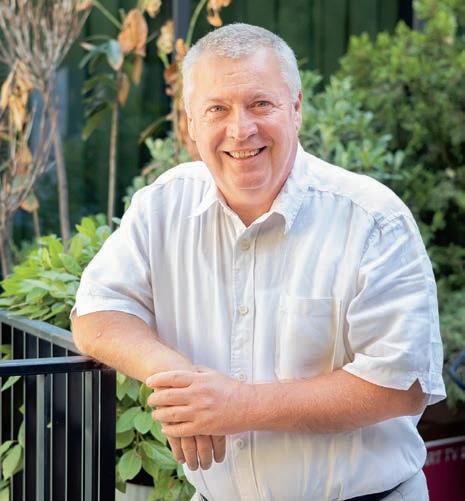
Miloš Latinović writer and director of Bitef Theatre
once wrote: “the Hamburg Score (a term first used by Viktor Shklovsky in reference to the secret fights between wrestlers in Hamburg that would be used to determine which of them was stronger, but for themselves and not for the audience) of my life is complicated, but it is exclusively the fruit of my personal choices and actions”.
I
In my practice, autonomy of choice and action relate to the duality of devotion to literary creation and the parallel creation of a repertoire, artist selection, the atmosphere at work and responsibility for the work and operations of Bitef Theatre and the festival. The artist is thus both a servant and a ruler.
And that is the most precise result of the preceding computational operation – a serious but liberal upbringing, which came to represent the foundation of preparedness to make important yet conscious decisions. Coupled with another fundamental factor, which is often overlooked by those who write about themselves, and that’s growing up in a tolerant multi-ethnic milieu – of Banat, Vojvodina, Serbia and Europe.
After many years and published books, I today understand writing work as a necessity of personal choice. My choice, and intention, is to take artistic action in society, while my job as a writer is to imagine and construct, dream and search, and thus create my own reality, just as God created the world.
The job of Bitef Theatre and Festival director is colourfully defined as the responsible task of the guard of a treasury, with the obligation to periodically dust and move the exhibits to more attractive locations. Even after 35 years, we still don’t have anyone like the “lady from the big world” that was Mira Trailović, nor her artistic partner Jovan Ćirilov. Conceiving Bitef was an endeavour that’s difficult to imagine when one considers the historical context of the late 1960s. Devising and organising a groundbreaking festival in the “land of peasants in the hilly Balkans” was an incredible vision, but also the only possibility during that time of the bloc division and the bifurcating of the world that we are still witnessing today. In the Belgrade of the time, Bitef was a link binding two worlds. It seems like nothing’s changed today. I’m not happy about everything happening in Europe, but I’m happy because Bel-
grade is again a place where we can all come together. Artists and journalists, politicians and financiers, visionaries and spies. May everyone do their own job, but may there be peace and let the game of the theatre continue.
The task of my free will – which has been transferred to the Bitef team – is for me to enable everyone to do their job: the artistic director and his associates fulfil creative visions; the artists who find optimal conditions, the journalists who provide relevant information, the guests who have the comfort of accommodation and a unique theatre offer.
This differs from the lonesome and troublesome work of writing, but it is similar in part through dynamic plot changes and the introduction of new
I’m not happy about everything happening in Europe, but I’m happy because Belgrade is again a place where we can all come together. Artists and journalists, politicians and financiers, visionaries and spies
characters to the story. It is sometimes still necessary to haul the halyards and release the mainsail to stretch and catch a good wind in order to direct the ship towards the land of happiness. The writer suffers slightly when the director works, while the director, in rare moments of leisure, dreams longingly of a balcony overlooking the sea, a small table in the shade of an olive tree, Pastis in a glass, pen in hand and white paper in front of him.
The truth is that a person is happy when they get that which they love, and not when they get that which others think they should love.
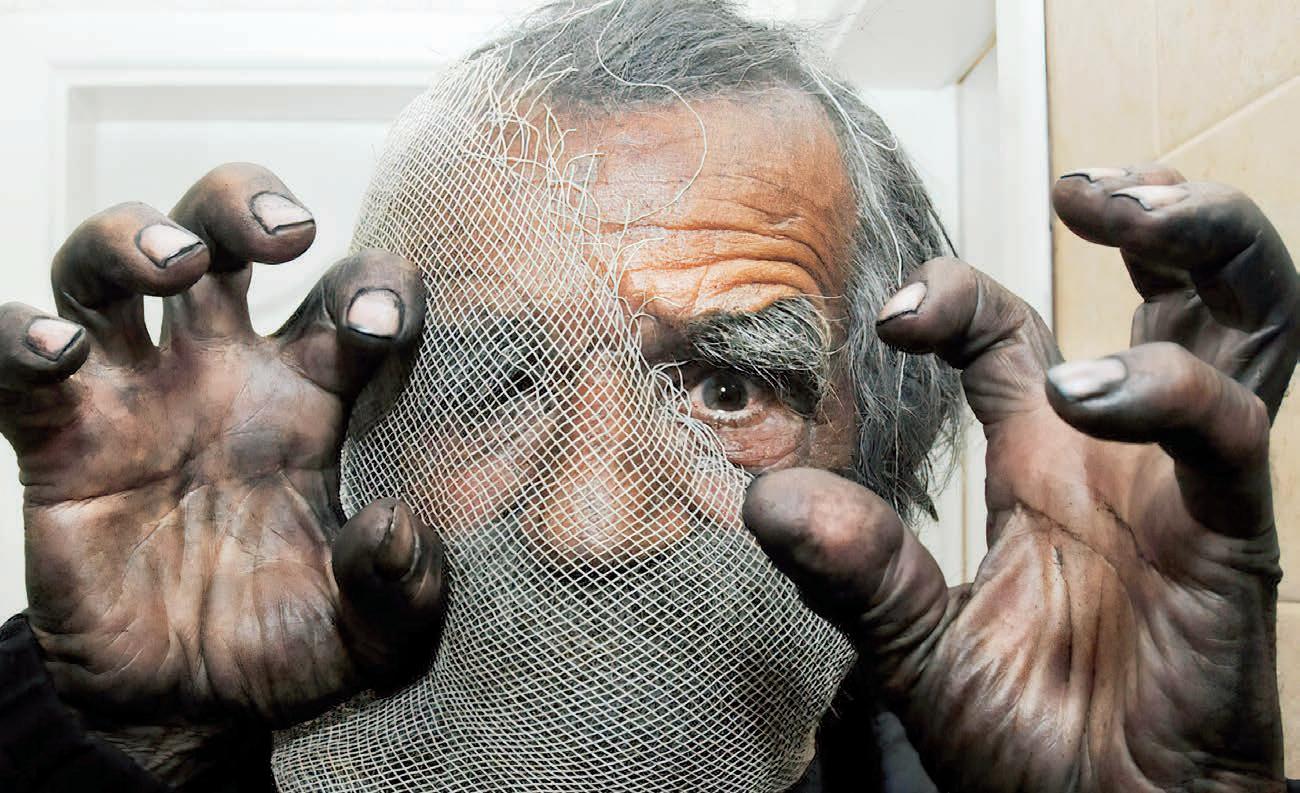
A pioneering figure in Montenegrin and Yugoslav art, Uroš Tošković left an indelible mark on the modern art world through his deeply reflective and emotionally charged works, blending existential themes with a relentless pursuit of artistic truth of a
Uroš Tošković Painter and Draftsman
Uroš Tošković, a celebrated Montenegrin painter and artist, has often been described as one of the most enigmatic and influential figures in the post-war Yugoslav art scene. Born on 19 November 1932, in Pelev Brijeg, Montenegro, Tošković’s early life was shaped by the rugged landscapes of his homeland, which would later influence the raw intensity and emotional depth of his work. His deeply reflective and emotionally charged works, blending existential themes with a relentless pursuit of artistic truth, resonate with a profound emotional depth that invites the viewer to connect with his art on a personal level.
Tošković’s journey into the world of art began in the harsh environment of World War II Montenegro. Despite the adversities of war, he was a child during the war, an experience that profoundly influenced his worldview and artistic expression. After the war, he moved to Belgrade to pursue his passion for art. He enrolled at the Academy of Fine Arts in Belgrade in 1952, where he studied under the guidance of some of the most prominent artists and professors of the time, including Marko Čelebonović and Petar Lubarda. During his time at the academy, Tošković developed a distinctive style characterised by bold, expressive lines and a deep, almost primal connection


to his subjects. His early works often depicted scenes of rural life in Montenegro, imbued with a sense of both reverence and melancholy.
In 1956, Tošković moved to Paris, a city that was then the epicentre of the global art scene. During his time in Paris, he became part of the École de Paris, an informal association of
His Paris years’ works are deemed his most significant, encapsulating existential angst and the search for identity
artists that included some of the most significant figures of the 20th century. Paris provided Tošković with a platform to explore his artistic potential, and his work during this period was marked by a blend of abstraction and expressionism, characterised by vigorous brushstrokes and a dark, almost brooding palette.
His works from the Paris years are often considered his most significant,
as they encapsulate the existential angst and the search for identity that were central themes in his life and art. Tošković’s art from this period reflects a deep psychological exploration, often portraying distorted human figures that convey a sense of alienation and inner turmoil. His paintings and drawings frequently depicted solitary figures, often struggling with invisible forces, symbolic of the human condition’s inherent struggles.
Tošković’s time in Paris also brought him into contact with other influential artists and intellectuals of the time, such as Pablo Picasso and JeanPaul Sartre. These encounters further shaped his artistic philosophy, reinforcing his belief in the power of art to transcend the mundane and connect with the deeper truths of existence. Tošković was never one to conform to the trends of the time; instead,

he remained true to his vision, often at the cost of commercial success. His refusal to compromise on his artistic integrity earned him the respect of his peers, even as it led to a life of relative obscurity outside of art circles.
Tošković mentored a new generation of artists, inspiring them with his unwavering dedication and rejection of conventions
Despite the success and recognition he found in Paris, Tošković returned to Yugoslavia in the late 1960s. His return marked a shift in his artistic focus, with his works becoming more introspective and personal. Back in Yugoslavia, he continued to explore



themes of human suffering, existential dread, and the absurdity of the human condition, often drawing on his experiences during the war and his life in exile.
He often shunned the commercial aspects of the art world, choosing instead to live a life of poverty and artistic purity
Tošković was known for his bohemian lifestyle, often living on the fringes of society. This lifestyle, coupled with his intense and often tumul-
tuous personality, made him a somewhat mythical figure in the art world. Despite his immense talent, Tošković often shunned the commercial aspects of the art world, choosing instead to live a life of poverty and artistic purity. His works from this period are characterised by a raw, unfiltered portrayal of the human experience, often challenging the viewer to confront uncomfortable truths about existence. During this time, Tošković also became a mentor to a new generation of Yugoslav artists, many of whom were inspired by his unyielding dedication to his craft and his rejection of artistic and societal conventions. His influence can be seen in the works of numerous artists from the region, who adopted
his emphasis on emo tional authenticity and his use of art as a means of ex ploring the deep er aspects of the human psyche.
Uroš Tošković passed away on 3 March 2019, but his legacy continues to live on through his works, which are held in high regard by art collectors and institutions worldwide. His art is often seen as a reflection of the human condition, with its raw intensity and emotional depth capturing the complexities of life in a way that few artists have managed to achieve. Tošković’s works are not merely visual

representations; they are deeply emotional experiences that challenge the viewer to look beyond the surface and engage with the underlying emotions and ideas.
Tošković remains a significant figure in the history of Yugoslav and Montenegrin art, his works serving as a powerful reminder of the existential struggles and the search for identity that defined the post-war period. His life and art continue to inspire new generations of artists, ensuring that his legacy will endure for years to come. His influence extends be-
yond the borders of the former Yugoslavia, with his works being recognised and appreciated by art lovers around the world.
Uroš Tošković was a complex and deeply introspective artist whose works resonate with a profound sense of human experience. His contributions to the art world, particularly during his time in Paris, have left an indelible mark on the history of modern art. Tošković’s life, marked by struggle, introspection, and a relentless pursuit of artistic truth, serves as a testament to the power of art to capture the essence of the human condition. As an artist who consistently defied expectations and remained true to his vision, Tošković’s legacy is one of unwavering commitment to the exploration of the human soul through art.



She is the more appealing face of Serbia, a highly sought-after composer who creates by invitation for Carnegie Hall, London’s Royal Academy of Music, Beijing’s Forbidden City Chamber Orchestra etc. The author of more than 100 pieces of music, she is recognised worldwide for her operas, ballets, symphonic and chamber orchestra music. A full-time professor of the Academy of Arts Novi Sad, she is set to become a member of the Serbian Academy of Sciences and Arts this autumn
Aleksandra Vrebalov composer
By Radmila Stanković
Music has been her choice since as far back as she can remember, and she never had a desire to do anything else. She was only a flamenco dancer once, in a dream. Devoted, talented, capable and extremely successful, Aleksandra Vrebalov (1970) spent 30 years honing her talents and working in America. Her life unfolds generally between Novi Sad and New York. Born in Novi Sad, she earned her master’s degree

and doctorate in America, then lectured in Michigan and New York. Hundreds of performances of her works are planned in numerous Serbian, European and American cities over the course of this year alone, from New York’s Lincoln Center to San Francisco, Maastricht, Brussels, Belgrade, Novi Sad and elsewhere.
Odes to her works have been published in prestigious world magazines. The New York Times critic wrote af-
ter one Carnegie Hall concert: ““It’s a testament to Ms. Vrebalov’s skill that the result is a unified and purposeful work (Babylon, Our Own), combining depth and a great deal of surface polish, beauty and even fun. Her musical language, inflected with Balkan and klezmer idioms, is vivid and free of clichés. Its relationship to the music and poetry of the past — recorded, inherited, memorized — is refreshingly unneurotic.”

This summer saw CorD’s interlocutor selected at the Department of Arts to become a member of the Serbian Academy of Sciences and Arts, SANU. She thus follows in the footsteps of Ljubica Marić, which were continued by Isidora Žebeljan. There is good reason why those who are greats of their work desire the status of academics, but this composer dreamt of something else.
“At that moment, in 2019, when I was invited to present my work at the Novi Sad branch of SANU, I wasn’t personally acquainted with almost a single person at that branch. The reason for that lack of personal contact is that my creative journey has mostly unfolded abroad; I was educated and spent almost 30 years living in the U.S. That’s why it’s a great honour that I’m on the list of selected candidates for election this autumn. I can’t say that I wished for this recognition, it somehow wasn’t in my line of sight – my attention has always been on challenges in the narrowest creative sense; I wished to have my works performed at Carnegie Hall,
for example, or to experience hearing them performed by top musicians using historic, legendary instruments –and that has actually happened for me on many occasions. My approach to work and creativity is focused on the work itself, more than on its standing and external evaluation, and I believe that recognition comes naturally when work gains momentum over time and with dedication. I am, of course, impressed by the SANU candidacy and see it as a great honour and privilege – for me to create at a new level, to contribute to the wider community and our country’s culture.”
Aleksandra’s parents, grandparents and great-grandparents all lived in Banat and Bačka, from Melenci via Sombor to Mohač: the Vrebalovs, Kneževićs, Gucunjas, Djurićs, Jelačićs, Ferenčevićs, Stojkovs, Maleševićs. Her father insisted that she know even the maiden names of her great-grandmothers.
“I was taught that posterity and care for future generations are the very meaning of existence; that freedom and truth are inseparable catego-
Grawemeyer Award, 2024, University of Louisville: (L to R) Kelly Nielsen, Aleksandra Vrebalov, Rev. Charles Halton, Ann Masten, Neta Crawford, Laura Hamilton
ries. ‘Patience = saved’ was a favourite sentence of my great-grandmother Julka, which was passed on to us children by our father. Being neat and tidy, expressing ourselves and moving slowly, despite our temperaments and quick minds, being loyal, think things through, but act from the heart and gut – these are some of the messages that remain. None of my ancestors are with us any longer. My family today is my four sisters and brother from my father’s three marriages: my sisters Vera and Marija with their husbands and children; Simona, Zorka, Boško and their mother, my stepmother, Valentina. I love it when we’re together. We all look alike and have a similar sense of humour.”
Aleksanda took long walks from an early age. During the ‘90s, famous writer Aleksandar Tišma and the city’s
Creativity is the only topic when the budget to create something is zero, but also when it’s huge
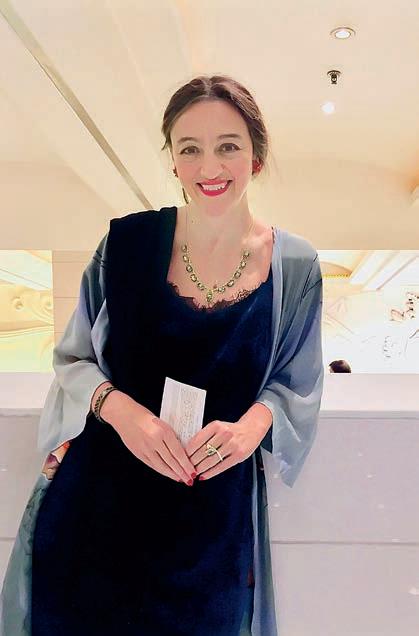
most famous walker, publisher and writer Miroslav Mandić, would walk intensively together in Novi Sad. And our interviewee was encountered them near Miletić Square, when Mandić introduced her to Tišma:
“It turned out that I had Tišma’s The Book of Blam in my bag – I showed it to them. That was a magical encounter that had been somehow destined to occur due to that book in my bag. We would later meet regularly at the Salon of our mutual friend Dušan Mijić, where I was the youngest and sometimes the only woman at the gathering – we would side by side and engage in sporadic conversation. He would do so because he wasn’t among the most talkative of people, while I kept quiet because everyone else had more to say. He knew that I loved his work and was interested in what I was creating. When I wrote Pannonia Boundless, which had been commissioned by the Kronos Quartet in 1997, he brought me some of his vinyl records of Romanian Romani music to help me prepare for the work.

I was taught that progeny and care for future generations are the very meaning of existence
I once asked him where he felt he most belonged of all the places where he’d resided. He said – well, here (Novi Sad). I was then attracted by the wider world; my music was already being performed abroad and our milieu seemed too small and disinterested in art, I didn’t understand him. The place where we spend our youth, where we experience the strongest emotions, is the place where we feel true to ourselves the most.
Forbidden City Orchestra premiere in Beijing, 2018
Portrait with Nude by Cuca Sokić, 2023
Milan Konjović and Tišma were two greats around whom I matured, and I heard that from both of them. They returned to their (small) towns, having accurately and critically evaluated the social juncture, but by maintaining their focus on their own work. They sometimes looked distant to me, but I later realised that that was the only way to save space for creativity. They both had inner discipline and calm-

ness, but radiating from them was eros, the instinct for self-sustainability, without which there can be no creation of either biological life or art.”
The recently departed composer Zoran Erić (1950-1024) had been Aleksandra’s mentor during her composition master’s studies in Belgrade during the early ‘90s, until she transferred to the Conservatory in San Francisco, where she earned her master’s.
“He would spend long hours with us students in the studio, after which we would go to Slavija Square late at night for burgers. He didn’t differentiate between dedication to his own work and to ours. He encouraged me to create schematic representations of musical forms, which has today been built into a process that’s typical of my work. His music reflects precisely the personality that he was: rich, emotional and unforgettable. He came to Novi Sad for us to have lunch together a few months prior to his death. That was our last meeting. We discussed professorship and the importance of maintaining the highest academic standards even when the system is collapsing around us. I never had a more dedicated mentor.”
She arrived in San Francisco in the August of 1995 and shared a house in the Sunset District, located next to the Pacific, with three students. Everything was new to her – from Santa Claus strolling through the sunny city decorated with palm trees and the smell of the ocean in the middle of winter, to unexpected conversations with total strangers. She learnt that this was part of American openness and curiosity, which she fell in love with and adopted.
“We worked with a lot of enthusiasm at the Conservatory, addressed the mentors informally, snatched each other’s practice rooms, and because we’d all came from different places, we were each other’s pillars of support. Both San Francisco and New York, where I moved to in the year 2000, were flourishing cities from an artist’s point of view: money was distributed more evenly, the IT sector wasn’t yet so developed, artists were able to pay rent in the city, political divisions weren’t as drastic as they are today, emigrants could find work more easily. Life was blossoming, just as we would imagine the late 20th century in the West. In comparison to the Balkans, America was a country of abundance, freedom of expression and movement, orderly institutions and systems: from education to public transport, to the financing of art from private funds and, to a lesser extent, state funds.
“Then September 11th happened, followed by the financial crisis of 2006 – the attitude towards immigrants changed, and the budget deficit of large art institutions led to them transforming or disappearing. In an attempt to attract audiences and remain relevant, they focused on art with an agenda and commercial approaches – for example, film directors directing operas, pop musicians composing for symphony orchestras, famous fashion designers creating stage costumes for plays. The scene is still exciting, bubbling with ideas and openness, political views, innovations, although over the past ten years, and particularly after the pandemic, I miss the idea of art for art’s sake.”
She has visited China on multiple occasions over the past six or seven years. During those stays, composers from Eastern Europe were familiarised with traditional Chinese instruments, in order to be able to write new pieces for them, though in a Western style.
“That is a considered, systematic approach to cultural policy that’s impressive, as art is a state project. I travel lots and work with artists and

Premiere of opera Mileva, October 2011, Serbian National Theatre Novi Sad: Isidora Žebeljan and Aleksandra Vrebalov
New York, TImes Square 2018
institutions from Asia, Europe and North America. Every milieu in which I’ve worked supports creativity to the extent that is harmonised with social currents; if it isn’t supported by the system, there are always micro milieus functioning independent of the dominant scene. The forms that I deal with have support from completely different sources.
“The support of art takes place at several levels - take the example of freedom, mass scale and ideology. I had the greatest artistic freedom under circumstances of the smallest or
extremely large resources, both locally and globally, because creativity is the only topic when the budget to create something is zero, but also when it’s huge. Art at the level of mass appeal is directed towards the spectacular, materially secured, always sys temically supported, but with a controlled, predefined result, which in its initial setting limits the exploratory, undefinable dimension of art. The ideological level, where support for artistic content is defined in accordance with a social/political agenda, is a characteristic of all milieus, from the most liberal to the most conservative. It (support) depends on social currents and the dominant ideology, sometimes directly, sometimes subtly, limiting non-likeminded artists in terms of securing funding from funds, a media presence and other resources.”
In the field of composition in Western Europe, as well as in America, care is today taken to ensure that artistic programmes are filled with works by composers of various identities.
“Established institutions, prestigious awards and commissions are adjusted to even out various historical imbalances in presenting the full spectrum of the human experience.

The positive side of these efforts is that we’re witnessing an eruption of personal and artistic narratives that are different, and thus expand the collective experience of ‘the other’. Maybe the collateral damage of this process is that the craftsmanship side of art, which relies on rigorous discipline and learning from th e mastery of our predecessors, becomes secondary. Art is continuity, and ability comes from being familiar with the creator’s heritage. But, as it (heritage) is connected to old power structures, it is considered antiquated and undesirable, like the rejected power structures themselves.”
In 2011, to mark celebrations of the 150th anniversary of the Serbian National Theatre in Novi Sad, her opera ‘Mileva’ was performed. This piece is about Vojvodina native Mileva Marić, scientist and wife of Albert Einstein, whose life proved inspirational for Aleksandra, because the idea of ‘The Other’, as defined by Edward Said, is obvious in her fate.
“She had a physical disability, was an immigrant, married into a different religion, was the only woman studying in her class in Switzerland and lived with the consequences of all that ‘otherness’. Her fate, in the context of marrying the greatest scientist of the

leva Einstein, instead of just Mileva, due to the opinion that the opera would have higher attendances if we added her surname to the title. This request was layered with multiple ways to read and understand our relationship towards power and authority, which, one one hand we feel like criticizing, while simultaneously taking advantage of it.”
Aleksandra was connected to prematurely departed composer Isidora
Milan Konjović and Tišma were two greats around whom I matured
20th century, could have been one of the greatest and most beautiful stories of the last century: two young scientists creating together, having a family, pushing the boundaries of science, overcoming taboos on various fronts. But the reality was different – Mileva’s fate was tragic, operatic, so to speak - she was left without health, a family, a title and status in science; without love.
“Apart from Mileva’s life, I was also inspired by our collective attitude towards her and Einstein. There were initiatives to title the opera Mi-
Žebeljan (1967-2020) by her Vojvodina origins, music, mutual friends who they met as children through their parents, Isidora’s husband Borislav Čičovački, who is one of Aleksandra’s dearest friends from her time as a student at the Novi Sad Academy.
“I share my Sombor roots with Borislav, and childhood walks around Sombor’s Great Cemetery, where both of our mothers are buried. I departed for America immediately after completing my studies, while Borislav moved to the Netherlands. Years passed, decades to be precise.
With students in Novi Sad Vrebalov, Beljanski, Mrdaković, Mastikosa, Pićurić
Isidora and I created untiringly. We met up very rarely and I’m sorry that we never actually got to know each other well. I’m left with memories of short, cheerful meetings with our mutual friend Nenad Stojacic. She was supposed to come to New York six or seven years ago – I was looking forward to meeting her and the possibility of hosting her there. That didn’t happen, and nor did my desire for us to get better acquainted, to meet up and talk sometime in the future – about the operas we wrote, about creativity generally, about life. I was delighted to see her at the premiere of my opera ‘Mileva’ at the Serbian National Theatre in 2011. My late father took a photo of us - he captured a moment of some humour, lightness and closeness between us. We come from the same source, like two rivers or two plants from the same soil. I would like for her to be here, creating and living, as life would be greater and richer.”
This year is also a very significant one in Aleksandra’s life due to her having received the biggest international award for her work: the annual Grawemeyer Award for Music Composition.
Hollywood star Meg Ryan received the prestigious Honorary Heart of Sarajevo at the 30th Sarajevo Film Festival in recognition of her remarkable contributions to the art of film. The award was presented to her at the Coca-Cola Open Air Cinema, a fitting tribute to her enduring impact on the industry. In her heartfelt acceptance speech, Ryan praised the resilience and spirit of Sarajevo, saying, “Thank you for your hearts. Thank you for your example. That’s Sarajevo.”
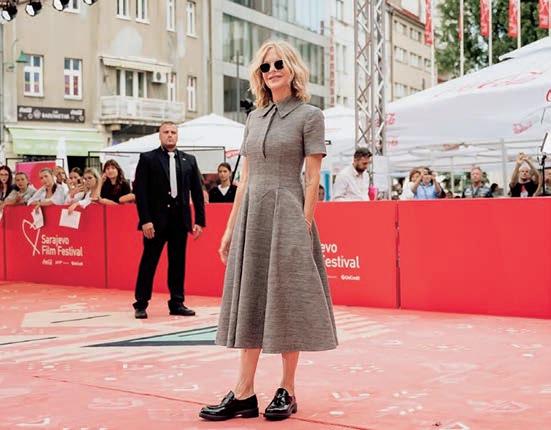
The latest edition of Germany’s iconic Duden dictionary has been expanded by 3,000 new words, while 300 outdated terms have been removed, reflecting the dynamic evolution of the German language. With a monumental 151,000 entries, the new Duden remains comprehensive, incorporating many updates, particularly from warfare and culinary trends. Among the latest additions are terms like “Balkonkraftwerk” (solar panel on a balcony), “Deutschlandticket” (a nationwide discounted travel pass), and “Ukrainekrieg” (war in Ukraine).

According to Guinness World Records, Tomiko Itoka, a 116-yearold Japanese woman who was once a mountain climber, is now officially the world’s oldest person. This is following the death of 117-year-old María Branyas from Spain earlier this week. According to the American Gerontology Research Group, Itoka, born on 23 May 1908, lives in the western Japanese city of Ashiya. She is the mother of three children and was born the same year the Wright brothers made their first public flights in Europe and America. In her 70s, Itoka frequently went hiking and climbed Japan’s 3,067-meter Mount Ontake twice, surprising her guide by climbing the mountain in sneakers instead of boots.

A brown felt fedora custom-made for the film Indiana Jones and the Temple of Doom and worn by actor Harrison Ford in the second instalment of the famous film franchise has been sold at auction in Los Angeles for $630,000. Other movie memorabilia, including props from Star Wars, Harry Potter, and James Bond, were also sold at the same auction.

According to recent research, Mercury, the most minor planet in our solar system, might be hiding a colossal secret: a diamond layer beneath its crust that could be as thick as 18 kilometres. Scientists from China and Belgium utilised data from NASA’s Messenger spacecraft, which orbited Mercury from 2004 to 2015, to investigate the planet’s internal structure. Its metallic core was completely liquid when Mercury formed around 4.5 billion years ago. Over time, this core gradually crystallised. The new study suggests that under extreme pressure, carbon dioxide present in the mantle transformed into diamond.

In 2023, European Union member states imported 105,104 tons of coconuts from non-EU countries, valued at 146 million euros, according to data released by the statistics agency Eurostat. Twothirds (67%) of these imports consisted of dried coconut (70,330 tons), while the remaining one-third comprised fresh coconut. Coconut imports from non-EU countries primarily came from five countries, accounting for 86% of total imports. The Philippines was the largest supplier, providing 40% of the EU’s total coconut imports. It was followed by Indonesia (17%), Ivory Coast (14%), Sri Lanka (8%), and Vietnam (8%).

From SAINT LAURENT’s classic loafers and adidas sneakers to sleek Brunello Cucinelli boots and polished Gucci, here’s your guide to starting the new season with style and confidence
TOM FORD
Logo-Appliquéd
Leather-Trimmed
Suede Sneakers
TOM FORD’s sneakers are made from leather panels, which are topstitched to form a ‘T’ on the sides

SAINT LAURENT
Le Loafer Monogram Logo-Appliquéd
Leather Penny Loafers
They’re a classic design that goes equally well with a smart blazer or cool biker jacket


Full-Grain
Leather Boots
These boots are crafted from leather with a natural grain and have sturdy, lugged soles you can repair and replace
Flex Suede Loafers
Crafted from supple suede, they have comfortable moulded footbeds and elasticated backs that you can collapse for easy packing


Hospoa Fringed Leather-Trimmed

Suede Sneakers
Modelled after retro running sneakers, these suede low-tops have fringed leather heel tabs and gripped Vibram rubber soles that wrap onto the toes and side walls for optimal traction

TOD’S
Suede Penny Loafers

+ Craig Green Squash Polta AKH Suede-Trimmed Canvas Sneakers
Based on an ‘80s squash design, these ‘Polta AKH’ sneakers are made from canvas, fuzzy suede and leather and have transparent panels that reveal the signature ‘3-Stripes’

Horsebit Studded Leather Loafers
Balancing out their eclectic design are their classic profile and the house’s horesbit chain across their vamps
Tod’s penny loafers pay homage to the label’s iconic ‘Gommino’ driving shoes with embossed rubber pebbles along the heels and soles


Orbit Metallic Rubber and Mesh Sneakers
Wrapped in metallic rubber, they’ve been made in Italy from mesh and feature seethrough panels that nod to the signature intrecciato weave
4 September - Tasmajdan
Nikos Vertis - one of the most famous Greek pop singers, delighted our audience at last year’s concert and is now returning to Belgrade. With his hit melodies, which many of our performers have covered, and his emotional lyrics, this concert will undoubtedly be an unforgettable experience for everyone present. He is expected to perform his biggest hits like “An Eisai Ena Asteri” and “Thelo na me nioseis,” which are always accompanied by ovations from the female audience and the lights of mobile phones.

15 September


27 September – Sava Center
Five of the world’s most talented magicians are coming to Serbia this fall with the most spectacular event of the year—the show “C’est la Magie.” Master illusionists Luis de Matos, Darcy Oake, James More, Yu Ho-Jin, and Enzo Weyne will blur the line between fantasy and reality, delivering a mesmerising performance that will leave you spellbound. Magic enthusiasts will witness and participate in daring new tricks, making this an unforgettable experience for all.
6,7 September – Sava Center
Whether visiting Belgrade as a tourist or participating in the first IRONMAN 70.3 event in Serbia, which is expected to be one of the fastest races in the 2024 calendar, this city will take your breath away. And while this isn’t exactly a cultural event—unless you consider the culture of sweat, grit, and determination—we couldn’t let you miss out on it! During the race, you’ll experience the beauty of Sava Lake, the city’s waterfront that merges several centuries of architectural history, including the magnificent Ada Bridge. The race perfectly blends breathtaking history, modern sightseeing, and a fastpaced course.

Mark your calendars for an enchanting cultural experience at the Sava Center this September! On Friday, the 6th of September 2024, immerse yourself in the grandeur of opera with a performance of “AIDA,” followed by a captivating ballet performance of “RASPUTIN” on Saturday, the 7th of September. Don’t miss this two-night celebration of opera and ballet, promising an unforgettable journey through music and dance.

J.K. JACKSON
Stories of the Serbian people are both poetic and strident, reflecting their proud heritage as Southern Slavs, who, in the years after the fall of the Western Roman Empire, swept South, taking over the lands of the once great Ancient Greeks, the Latins and the Thracians.


Robbie Busch, Jonathan Kirby
Paying tribute to this art form, Rock Covers brings you a compilation of more than 750 remarkable album covers, from legendary to rare record releases. Artists as varied as Elvis Presley, The Beatles, The Sex Pistols, Pink Floyd, The Cure, Iron Maiden, and Sonic Youth are gathered to celebrate the cover art that defined their albums and their cult status.
Jon Smith
The Deal is a unique and fascinating perspective into the sports management business through the eyes of ‘Mr Football’, ‘super-agent’, Jon Smith. 800,000 people watch their professional football team play each week, and TV pulls in audiences of around 600 million.

Timothy Ferris
Forget the old concept of retirement and the rest of the deferred-life plan - there is no need to wait and every reason not to, especially in unpredictable economic times. Whether your dream is escaping the rat race, experiencing high-end world travel, earning a monthly five-figure income with zero management, or just living more and working less, this book is the blueprint.


Yorick
Wilks
Artificial Intelligence is the essential companion to this unsettling science. It surveys AI’s history, philosophies, and current state and asks critical questions such as how robots should think and whether machines really learn. With subjects ranging from the World Wide Web to artificial companions, the book considers ethical issues such as automated warfare, internet surveillance, and fake news.

Patricia Highsmith
Tom Ripley wants money, success, and the good life - and he’s willing to kill for it. Struggling to stay one step ahead of his creditors (and the law), Ripley leaps at the chance to start afresh on a free trip to Europe. But when his new-found happiness is threatened, his response is as swift as shocking.


31/7/2024
The Embassy of Morocco in Serbia hosted a grand celebration to mark Morocco’s National Day Throne Day, an event commemorating the ascension of King Mohammed VI to the throne. The festive occasion was hosted by Ambassador H.E. Mohammed Amine Belhaj and attended by dignitaries, diplomats, and members of the Moroccan community in Serbia. The event highlighted the rich cultural heritage of Morocco. Guests were treated to an array of Moroccan culinary delights, offering a taste of the nation’s renowned cuisine.
31/7/2024


State Secretary at the Ministry of Foreign Affairs Damjan Jovic had talks today with Ambassador Michael Davenport, Head of the OSCE Mission in Kosovo and Metohija (OMIK), who made a farewell call on the occasion of the completion of his term. At the meeting, issues related to the work of the OSCE Mission in Kosovo and Metohija were discussed, with special emphasis on the specific problems faced by the Serbian population in the Province. In this regard, State Secretary Jovic stressed that the Serbs in Kosovo and Metohija were exposed to increasingly strong pressures and that the situation was further deteriorating due to the ban on dinar payments and the ban on goods from central Serbia. State Secretary Jovic thanked the interlocutor for his cooperation so far and wished him success in his future endeavours.
31/7/2024
This event was organised under the “Malaysia MADANI” framework introduced by Prime Minister Anwar Ibrahim in 2023, which aims to foster a more inclusive and prosperous society through good governance, sustainable economic growth, equal opportunities and prosperity, empowerment of marginalised communities, and the strengthening of national unity. The term “Madani”, meaning “civil” or “civilised”, embodies the values of integrity, progress, and social harmony through care, compassion, and mutual respect. Held in celebration of the Open House tradition, which best reflects the vibrant hospitality, cultural diversity, and spirit of collaboration and friendship that define Malaysia, the Malaysia Madani Open House 2024 welcomed more than 100 representatives from the Government of the Republic of Serbia, members of the Diplomatic Corps, representatives from religious and business communities, the media, and members of the Serbia-Malaysia Friendship Club.


8/8/2024
Chinese Ambassador Li Ming stated that Serbian students and high schoolers who are allowed to participate in a cultural exchange program in China will have the chance to learn about the country’s ancient traditions and its advancements and modern development in all areas. “This year, Chinese President Xi Jinping made a historic visit to Serbia. The two presidents agreed that 300 young Serbian people and teenagers would be invited to visit China on study trips over the next three

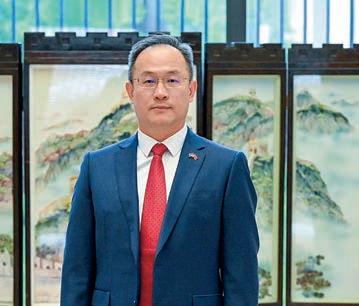
years,” Li Ming said at the Palace of Serbia during a reception organised by Serbian President Aleksandar Vučić for Serbian students and high schoolers travelling to China as part of the International Youth Cultural Exchange program. The Chinese ambassador highlighted that the group “Mint,” inspired by this agreement, initiated a student exchange program between Serbia and China. According to him, the two countries share similarities and great opportunities for mutual development.
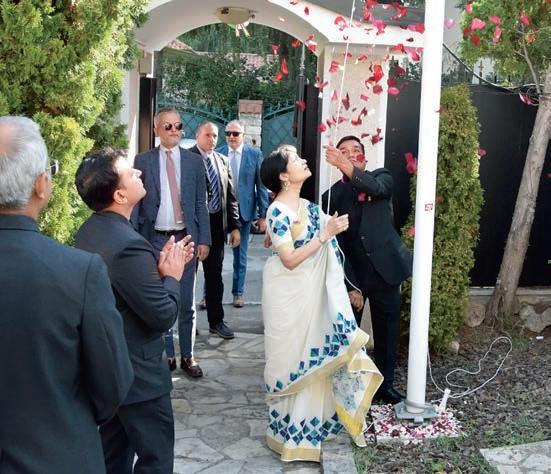
15/8/2024
Ambassador H.E. Mrs. Subdarshini Tripathi raised the national flag and sang the national anthem. After this, the Ambassador read excerpts from the Address to the Nation by the Honourable President of India, H.E. Mrs. Droupadi Murmu, delivered on 14 August 2024. The Embassy has been organising events for the past three years to showcase India’s rich cultural heritage and glorious history. On this occasion, the Embassy also organised an exhibition of Indian freedom fighters and handicrafts. Over 150 Indian nationals, Persons of Indian Origin (PIOs), and friends of India in Serbia enthusiastically attended the event. The celebration also featured a musical programme, including a sarod recital by an Indian national.
17/8/2024
The Indonesian Embassy in Belgrade held a ceremony at the residence of the Indonesian Ambassador to commemorate the 79th anniversary of the Republic of Indonesia’s Proclamation. M. Chandra Widya Yudha, the Indonesian Ambassador to Serbia and Montenegro, led the ceremony. In his remarks, the Ambassador highlighted Indonesia’s progress in implementing development policies across various fields. He noted that bilateral relations between Indonesia and Serbia and Indonesia and Montenegro continue to grow consistently. Indonesia and Serbia are fostering solid and friendly relations regarding political, defence, and security. “The visit of the President-elect of the Republic of Indonesia, Mr. Prabowo Subianto, to Belgrade and his meeting with President Aleksandar Vučić on 29 July exemplifies the close relationship between the two countries,” said the Ambassador. The ceremony was attended by Indonesian citizens in Serbia, friends of Indonesia, and representatives of the Indonesian Embassy in Belgrade.


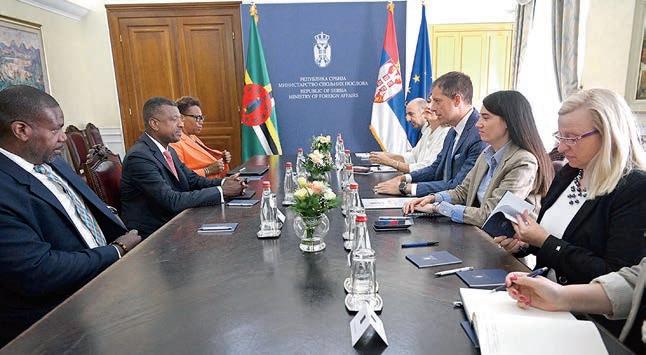
20/8/2024
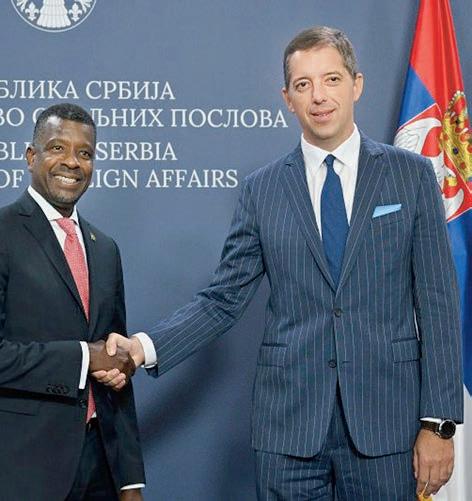
According to a government statement, Serbia and Dominica have signed a Protocol on Cooperation between their foreign ministries. The protocol was signed in Belgrade by Serbia’s Foreign Minister Marko Đurić and the Minister of Foreign Affairs, International Business, Trade, and Energy of the Commonwealth of Dominica, Vince Henderson, who is on an official visit to Serbia. On this occasion, Henderson noted that the friendship between the two countries dates back to the Non-Aligned Movement when Serbia supported Caribbean states in their struggle for independence. He recalled that Serbia and Dominica established diplomatic relations in 2010 and expressed gratitude to Serbia for extending a hand of friendship to students from his country studying in Belgrade. The minister stressed that the relations between the two countries are based on mutual respect and that Dominica firmly supports Serbia’s territorial integrity and sovereignty.


22/8/2024
The partnership between the European Union and the Nišville Jazz Festival lasted ten years. Plamena Halacheva, the Deputy Head of the European Union’s delegation to Serbia, emphasised the importance of this collaboration at the press conference marking the beginning of the 30th Nišville Jazz Festival. She highlighted that this partnership paves the way for new generations of jazz musicians. Ivan Blagojević, the director of the Nišville Jazz Festival, took the opportunity to thank the European Union, which, as he mentioned, helped the festival survive in recent years. In the past few years, the festival has successfully implemented projects through the Creative Europe program and the Interreg—IPA CBC Bulgaria—Serbia program.


24/8/2024
On 24 August, the Embassy of Ukraine in Serbia held a peaceful gathering in Novi Sad to mark the 33rd anniversary of Ukraine’s independence. The formal event occurred at the Taras Shevchenko monument in Miroslav Antić Alley. Among the attendees were the German Ambassador to Serbia, Anke Konrad, and representatives from the embassies of European Union member states. Ukrainian Ambassador to Serbia, Volodymyr Tolkach, addressed the gathering, expressing his deep gratitude for the humanitarian and military support of the European Union, the United States, Canada, and all friends whose help has been essential for Ukraine to defend its territory and freedom. This year’s celebration occurs on the 914th day of the war that Ukraine is fighting with Russia.

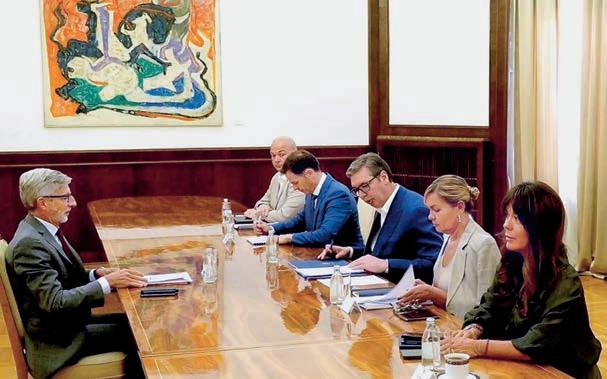
27/8/2024
Serbian President Aleksandar Vučić met with French Ambassador Pierre Cochard to finalise preparations for President Emmanuel Macron’s official visit. “Discussed practical matters with French Ambassador Cochard, the significance of this visit for strengthening relations between Serbia and France, as well as the agreements we will sign, which will bring long-term benefits for our citizens,” Vučić posted on his Instagram account. President Macron will officially visit Serbia on 29 and 30 August, during which he will visit both Belgrade and Novi Sad.













































